#why she has those principles and beliefs
Explore tagged Tumblr posts
Note
Jumping on the ask train, with an in-between question! From the medias you've watched so far, which one do you believe to be severely underrated, and/or deserving of much more attention/love? (Not necessarily something hated by the public, more like a piece of media that's completely ignored/ghosted for a reason or another)
I've already gushed about it in the past but- a little treasure of a piece of media I've discovered last year is the truly wonderful Excavation of Hob's Barrow, a horror themed classic point & click game. It's recent but perfectly mimicks the artistry of old LucasArts games and its atmosphere is incredible. Its genius is the setting - old england folk tales, the rainy moors, a backwater village wherein you're very much made to feel like the outsider that you are - the horror is slow, all-encompassing, it grows in intensity; and yet at the same time you learn to know this village and its people and feel a little less lost. You learn to know the land. And to respect its legends.
This game is very much underrated and I dearly wish more people would get to hear of it and give it a try.
I suppose it's held down by the fact it's horror AND classic point & click vibes, which are two factors that do not necessarily overlap in the average person's tastes. Personally it was right up my alley, and it's a huge favourite of mine from last year (and maybe beyond).
#the excavation of hob's barrow#video games#asks#mine#how many times will i gush about this game? the answer is yes#i really love to find a game that relies on english legends for their horror setting instead of stealing indigenous stories also.#cuz goodness knows this happens way too often#genuinely this game is a pearl#cuz it's not just a horror story#you get to learn about that unwelcoming little town. its people. you learn about your character's past and why she is the way she is#why she has those principles and beliefs#the dialogues and characterization is top notch. there even is character growth- in such a short lil game#everything is so good#best 9 hours i've spent on a game
6 notes
·
View notes
Text
I understand why this is the case, to be clear, because what we see of his character is extremely limited, but I find that so much fanon characterization of Colum Asht relies on the presumption that he's a normal person. Specifically, that he's a normal person who could be rehabilitated by people treating him normally.
In context, this is generally true, because he exists primarily in relation to an obsessive religious zealot whose external socialization consists primarily of telling people about themselves with zero regard for whether that's a normal or decent thing to do in context. Because we see Colum, with very few exceptions, constantly attached to Silas throughout GTN, he looks significantly more like a regular person who's sort of being forced to drag around a purse dog who bites. I believe no one has ever deserved to step outside for a cigarette and stare at nothing more than Colum; again, I understand where the characterization comes from. I do however think it's wrong. This post is very long. Sorry or whatever.
Colum Asht is deeply, fundamentally Eighth. I've talked before (warning: another long post) about the fact that Houses have individual cultures, rather than personality traits. Colum is exactly as bound up in Eighth religious practices as Silas is, even though those religious practices are explicitly used to oppress him into an early grave rather than elevate him to a position of power.
Until the full implications of Lyctorhood come to light, at no point does Colum ever reject a wholehearted embrace of Eighth beliefs. I think a lot of people consider the argument he has with Silas in ch. 28 to be a criticism of the religious beliefs Silas embodies, and I sincerely could not disagree more. Colum is angry about the fact that Silas has grown into someone who could be deliberately duplicitous and lie to another person to take advantage of them. He might be angry about the institutional processes that made him that way. He does not believe that this means that he, personally, should have expanded rights over his body or that his cavaliership to Silas is something he could or would walk away from. He does not believe that Silas is wrong with regard to his attitudes toward the Ninth as a whole.
We know this because Colum isn't exclusively following Silas around throughout the book, and he takes actions independently that are still indicative of deeply ingrained religious bigotry. Colum is perfectly allowed to talk to other people, but individually refuses on principle to talk to Gideon one-on-one or be in a room with her outside of a specific social context. Colum is explicitly not apologetic about taking Gideon's weapons from her when she comes into the Eighth's rooms despite being aware that it places her at a disadvantage and requires her to trust people who actively distrust her.
Even when Silas is present and seems to have more power over Colum's actions, Colum isn't uncomfortable doing things like asking Gideon to leave a common space entirely so Silas doesn't have to try to consume food and look at her at the same time. He wholly expects Gideon to acquiesce to this, not happily, but at least without argument. Colum isn't at all fazed by Silas accusing an entire room of people of being faithless sinners for refusing to bow to the will of the Order.
Silas' methods aren't Colum's methods, and Colum seems normal in comparison to him because he's significantly quieter about his beliefs and doesn't always follow Silas to every rhetorical extreme. Colum tends to do the polite thing where Silas is extremely blunt. He won't be in a room with Gideon or speak to her alone, but he'll bow to her before he leaves. Colum is sitting at the Fifth's dinner party speaking to Babs in some way that sounds normal enough for Babs to keep haranguing him, while Silas is telling Ianthe her parents should have been willing to experiment more when she was born dying/dead. Either way, neither of them acknowledge Harrow's existence.
Colum doesn't disagree with the basic religious principles on which Silas generally acts. Colum is fine with that shit. If Silas hadn't tried to resort to lying and taking advantage of another person to achieve his ends in a manner offensive to Colum's sense of honor and morality, there's zero evidence that Colum would have found anything else about his conduct objectionable enough to raise as an issue.
All this to say that I think if Magnus Quinn invited Colum for a pint he would show up and be reasonably respectful and courteous the entire time while calmly saying what to literally any other person would be the most deranged religious claptrap they'd ever heard. Colum thinks it'd be more humane to simply nuke the Ninth out of existence too fast for anyone to feel it rather than conducting a systematic inquisitorial dismantlement of the church involving spiritual torture. Colum is referring to necro/cav relationships using insanely antiquated and offensive terminology that he genuinely believes is the polite and considerate way to talk about them as opposed to deliberately derogatory language more commonly employed on the Eighth. The second Colum leaves Magnus orders himself five shots and includes them on his expense report.
#colum asht#silas octakiseron#[should she light it on camera voice] should she put it in the main tag?#the locked tomb
371 notes
·
View notes
Text
The Principle of the Universe
Theia and Proto comic, more context below.
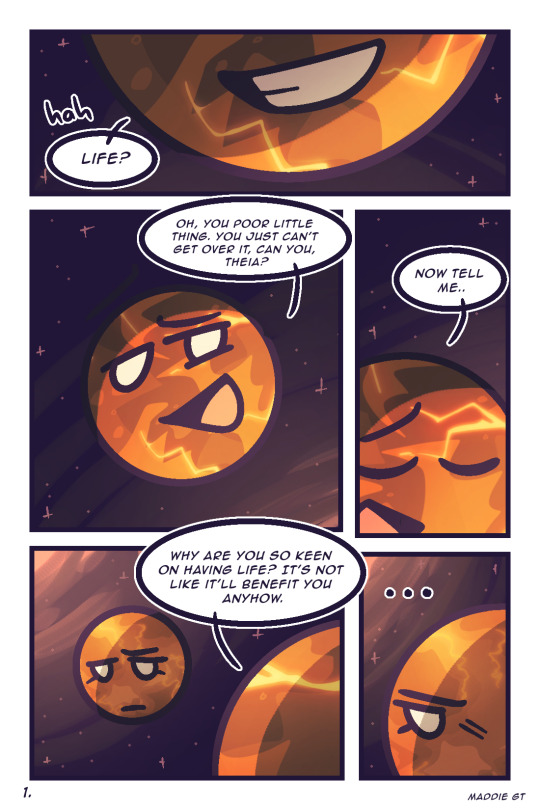
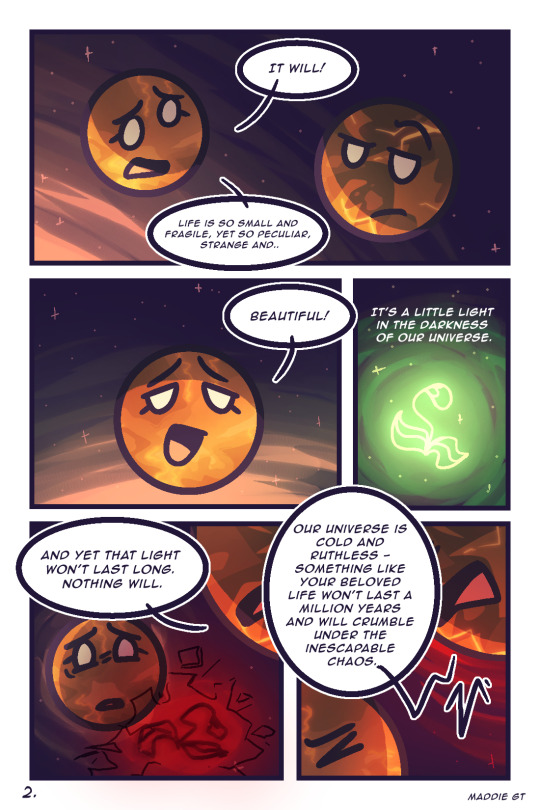
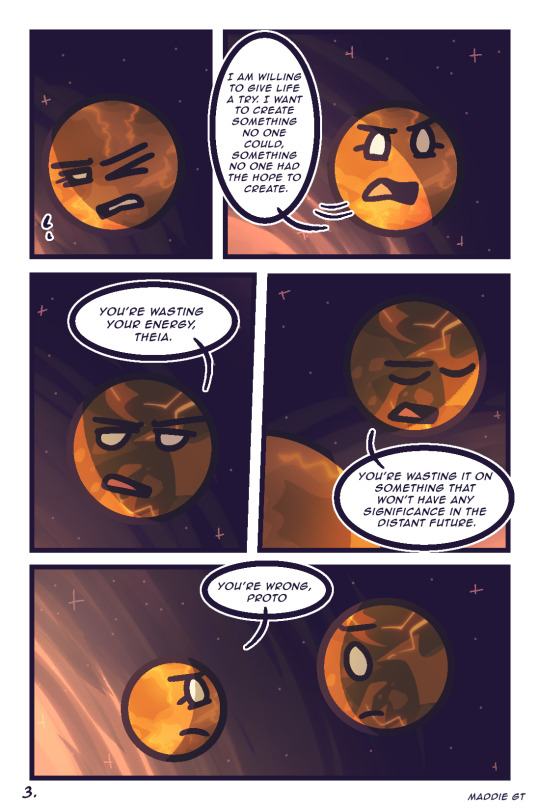
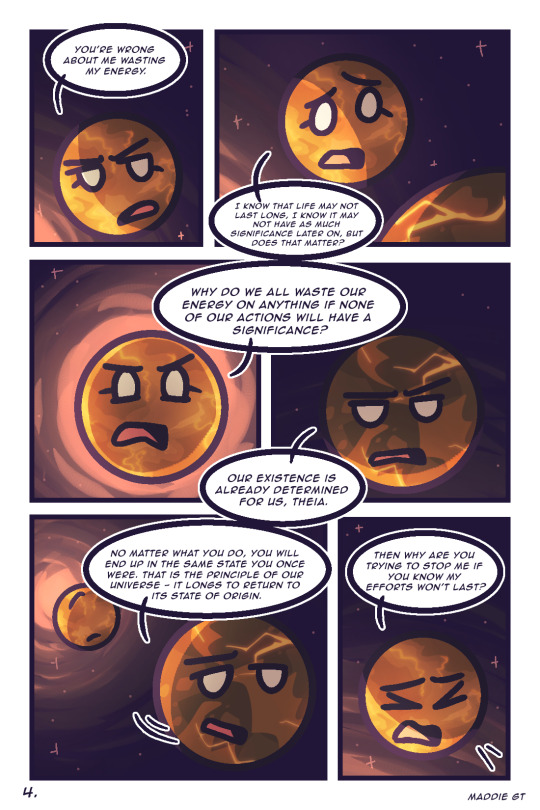
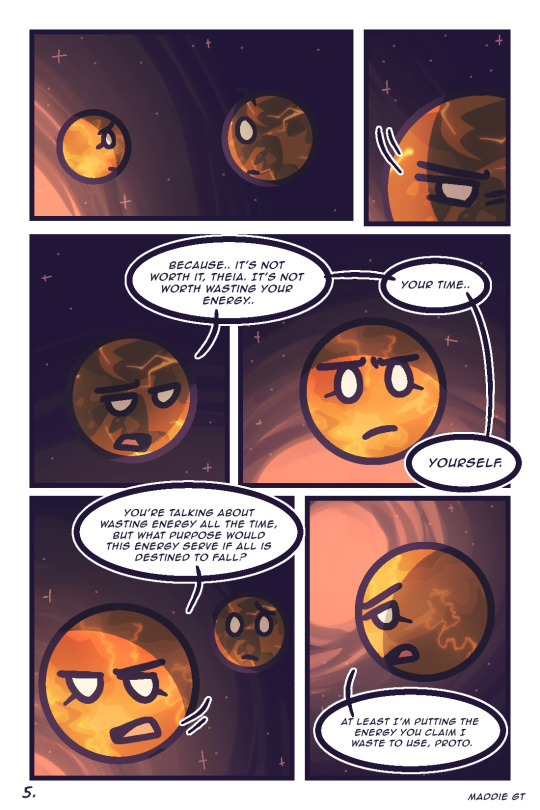

These designs are not official, neither are their depictions and this dialogue as a whole. I was not planning on drawing these two up until they actually appear in canon, but I couldn't hold myself from drawing this idea I had.
Let's talk about the setting first: we see Proto-Earth (or just Proto) and Theia somewhere in the inner solar system having a discussion on why Theia wants life. This comic is meant to take place before this dialogue (Alvaro, @ SolarBalls Discord Server), which is widely assumed to be a dialogue between Theia and Proto.

Now, what is this 'principle of the universe' Proto talks about? There is a natural flow of things, and one of those things that governs the spontaneousness in our universe is entropy. In an isolated system, which we suppose our universe is, the entropy increases, which means the chaos increases, a state our universe once was in. Going against the natural flow requires you to put work into something (a.k.a. energy). Proto lives by the principle that everything in our universe is predetermined by this law. For life to flourish, you need to put in a lot of work, which in his eyes is a waste of time and energy, because life is fragile and won't last long - so why waste your time on something like that?
But Proto does not try to convince Theia just because of this belief that life is useless. He knows that you need to do a lot of work for life to be possible in a universe such as ours - an amount one may not be able to carry out. He's worried about Theia, he deeply cares about her even if he struggles to show it.
But why do we still do everything despite possible failure? Theia sees life as something unique and special. It may not be something that will last for a million years, it's something very small and fragile, but despite everything it's still worthwhile. It's something you put effort in, it's something you create despite no one having hope for its success. It's a little light in the darkness of our cold universe.
Now, I image Proto to be a hopeless determinist and Theia a naive but lighthearted character. Both are standing in a constant contrast in this comic: Theia's will for life is represented by the "light". All frames she is in, there is also more warm colours and more stars in the background. Theia's asset has more curves, representing how life is something that flows within us. And a little addition.. while talking with Proto about the universe, she was using "our universe" at the start, but upon hearing what Proto said, she no longer wanted to be part of that universe and thus responded with "your universe" at the end.


Proto has not only a darker assets with more edgy lines, he is also 'standing' in a darker background. Him facing away from the light represents his neglect of what Theia is trying to tell him, resulting in her giving up on trying to convince Proto in the end, leaving him (slowly, in the end he starts to understand Theia as the background becomes lighter). There is a fallacy in his claim about "wasting energy": presumably, he thinks that wasting energy on unnecessary things is, well, unnecessary, but he's worrying about Theia which kinda speaks against his beliefs.
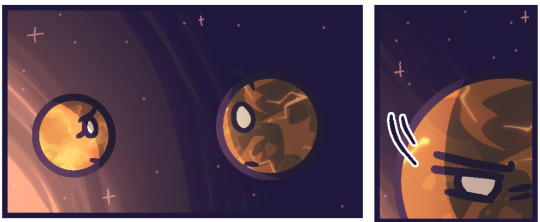
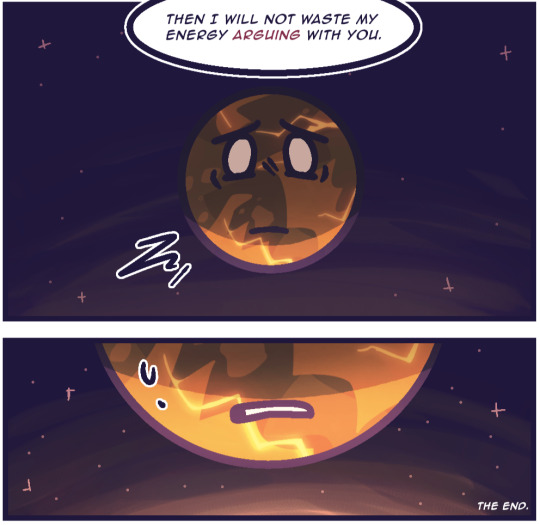
Theia may have not immediately brought light into Proto's darkness, but she showed him the path. A path both of them will take on..
#solarballs#solarballs fanart#solarballs theia#solarballs proto-earth#solarballs proto#solarballs comic
136 notes
·
View notes
Note
hi rukia.
can you do Rangiku kind of reader as Hades and Poseidon s/o, separately of course.
the other is up to you
T/N: Let’s see what I can cook up. 🧑🍳 I love Rangiku a lot. Top 3 BLEACH characters
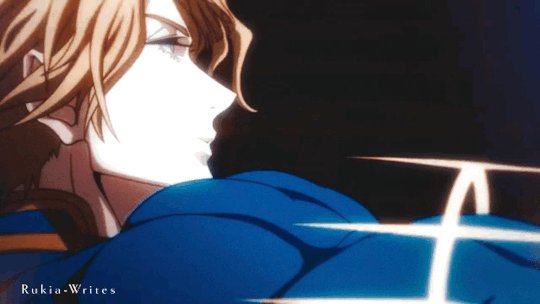
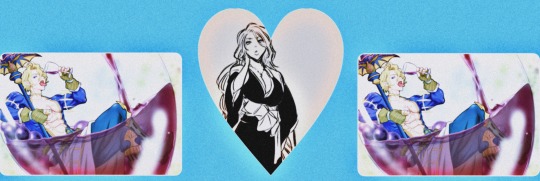

Poseidon.
Tyrant of ocean.
The Most Fearsome God.
Poseidon was that and much more.
A complex individual with his own principles and beliefs.
Poseidon also wasn’t much of a talker, he spoke only when necessity or when something was out of line.
However, not many people knew it but he did like talking. Rather, with someone. (Name), his beloved who was the opposite of him in every way and yet somehow the two clicked.
(Name) could be lazy, Poseidon had his days but he liked doing stuff.
Poseidon liked modesty, (Name) was a beauty with loved showing her body and curves getting the attention of other gods.
(Name) has an easy-going and free-spirited personality, Posieodn was the exact opposite.
The biggest contrast between the two that people noticed was that (Name) liked wearing human clothing and Poseidon always found that the hardest to tolerate about her as he considered human nothing but filth.
Yet, the two clicked.
“Human clothes again? You should take that filth off.”
“But I like it, the fashion those are developing is slick and stylish. If you want me to take off these clothes you’ll have to do it yourself.”
Yes.
No shyness or shame.
Poseidon sighed in response while she enjoying teasing Poseidon smiled as the other gods found their conversation “entertaining” as the cleared their throats changing the subject.
Zeus called the two the weirdest soulmates ever.
Before the two became an item (Name) was arguably the most beautiful goddess in Valhalla. Hades had a saying about her,” A voluptuous beauty with an adult charm in Valhalla. With her broad-minded personality, the chances of men in Valhalla who say no to her... simply do not exist."
Even Poseidon.
(Name) had a habit of whenever she felt like drinking, she would find free people and then invite them to come out with her, and then has them treat her to drinks, so that she wouldn't have to spend any money. Drinking buddies were many but she enjoyed Hades and Poseidon as drinking buddies.
Why Poseidon? People didn’t know.
Poseidon didn’t know. Unlike his brother, Poseidon wouldn’t talk much.
So, Poseidon came to the conclusion that (Name) was using for free drinks and while this could have been true…he didn’t care if it was.
Because he liked her company and he had more than enough money that he didn’t seem to mind.
That’s how it started.
From drinking buddies to lovers.
“Please, don’t tell me you brought that human shit.”
“Listen, listen. This is really good, top notch.”
“You said that last time. It was disappointing to say the least.”
“No, no. Not this one. Here, here. Just close your eyes, tip it back and swallow. It’s really good…See! That’s good right?!”
(Name) gracefully got the tyrant of the seas to drink the alcohol from the human world, only for Poseidon to say it was worse than the last one. Which made the two go back and forth that they had “bad taste” in alcohol.
Although, the next day (Name) was in for a real treat when Proteus invited her to Poseidon’s palace. In the dining room was a small bottle of wine, two wine glasses with Poseidon already at the table.
“Sit. I have somethings I wanted to discuss.”
Poseidon didn’t have to repeat himself as (Name) sat infront of him with a happy smile on her face while Proteus opened the wine bottle.
The two discussed politics and seemingly family problems.
Seemed like Poseidon when he had a few drinks would talk about family a bit.
(Name) mentioned that the wine was exceptionally great and took the bottle wanting to know where Poseidon got it from. Sure, (Name) had a few drinks but the wine wasn’t necessarily strong that she couldn’t recall what wine was what.
“What is this, Poseidon?”
“Wine from those humans. It’s called “Beaujolais nouveau” apparently.”
“…You like human wine-oh my god.”
Smiling in a teasing manner while Poseidon simply shrugged his shoulders, simply saying, “It’s not bad.”
“Not bad you say, and yet you took it. Why?”
“…You enjoy teasing me don’t you?”
“I’m just wondering why we are enjoying human wine, since you called it gross yesterday.”
Cold blue eyes saw how much his visitor was liking this situation, of course she was. A quick sigh and Poseidon poured her another drink and then himself.
“Shut up and drink.”
The two clinked their glasses together and enjoyed a night of drinking and talking.
Poseidon loved those moments.

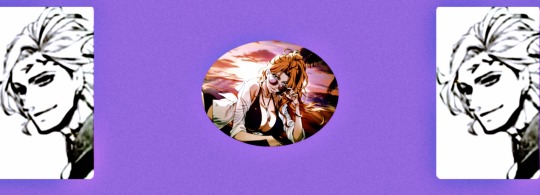

“That’s my seat.”
The unknown god that was seated next to his drinking buddy quickly got up from the seat as the king Helheim, not only being one the most respected gods but also feared wanted his seat beside (Name).
The gods were having a party, a reason didn’t have to be, and Hades managed to arrive just in time knowing (Name) was already partaking in the wine with a few unknown gods wanting her attention.
Something Hades didn’t like.
“Why is it whenever I leave you alone there’s always a no name god wanting your affection?”
“I honestly, didn’t notice him there. I think you scared him.”
Hades sat down beside (Name) and like any gentleman poured her a drink and then himself, sighing in a tired smile.
“Oh no, how dare I?”
“Jealous?”
“Protective. Now drink and tell me about why you’re visiting the human world for clothes.”
Hades didn’t have big disdain for humans like his brother Poseidon, (Name)’s other drinking buddy. While she had many drinking buddies Hades and Poseidon seemed to be her favorite.
(Name) also had a habit of going to the human world for clothes, sometimes the clothes were modest and sometimes they were a bit revealing.
Hades didn’t mind either.
(Name) was a rather beautiful goddess arguably the most beautiful goddess in Valhalla. She wasn’t above using her charms to get what she wanted which could be drinks, so she didn’t have to pay, or getting support on anything she wanted.
“They are comfortable. The humans aren’t all bad, great fashion sense. However, your brother thinks otherwise.”
“Of course he does. Especially, since you gave him that wine from the human world.”
“It was great! You had to admit it was great!”
(Name) seemed to already be a bit tipsy as she gently shook Hades shoulder trying to get Hades agree with her. Drinking from his wine glass, Hades eyes quickly, very quickly, glanced at down her shirt to admire those beautiful breasts.
Hades didn’t have to quickly look in honesty as (Name) and himself were close and (Name) liked it when he gave her compliments on her body or how she dressed.
“Whatever you say. I’m not arguing with you.”
“Good! I was hoping you would let me see your Bident.”
Hades kindly chocked on the wine he was drinking as a easy going and kindly flirty (Name) patted the top of his head with a teasing smile. A smile, Hades came to love just as much as the smile that was charming.
“You can’t see my bident. Are you insane?”
“Aw, come on! Just for a little while~”
Slightly giving Hades a peek down the split shirt, which Hades already took a quick peek at, but Hades quickly played coy. Saying that he couldn’t be swayed. Even when, (Name) tried again Hades still said no. As the night went on and the two talked, as though the two were the only ones there, and had some more drinks for the night.
“I don’t like cold men, Hades.”
“Then why are you friends with Thor?”
“He has good company! Just because he doesn’t talk to you doesn’t mean he doesn’t talk. Don’t laugh! It isn’t funny.”
Hades had to laugh.
Imagining the indifferent and cold Norse talking and keeping good company seemed a bit out there to think about. While laughing (Name) kindly shook him trying get Hades to take her seriously, it didn’t work.
But that was Hades way of flirting; teasing.
The two liked to tease each other whether the two were together personally or on the phone.
“You’re still on that?”
Days later, Hades was sitting on his chair in his king’s chambers reading a book while on the phone with his favorite drinking buddy; beautiful drinking buddy.
“If you won’t let me see your bident. At least name an attack after me. Shows that you love me~”
“What makes you think I love you?”
Hades had a smile on his face as he awaited (Name)’s answer, on the other end (Name) was back in the human world. Shopping no doubt.
“Poseidon told me.”
“Lies.”
“Are you calling your brother a liar? Shame on you~”
Smirking Hades found (Name)’s teasing and charming, that’s what he loved about her. That and how he could just be himself around her.
“I’m not calling my brother a liar. Just my favorite drinking buddy.”
“I’m hurt! Just for that you and I are no longer friends.”
Playing hurt (Name) knew Hades would reply back with something just as sly or funny and he did as he clutched his hand over his heart and pretended to be hurt.
“Oh no! Whatever will I do? My one and only friend is gone. I enjoyed placing my head on your lap. Looks like I’ll to find another place for my head to rest.”
“It’s not too late to apologize.”
“Good night, (Name). I’ll see you tomorrow.”
“Bye, Hades.”
The two said good bye and ended their call, Hades had to admit he must have had it bad if he found her saying bye to him was sexy.
(Name) was truly beautiful goddess inside and out.
Hades had a saying about her;
“A voluptuous beauty with an adult charm in Valhalla. With her broad-minded personality, the chances of men in Valhalla who say no to her... simply do not exist."
Her beauty alone was what made gods trip over their own feet, except for Hades. Hades didn’t seem to let her beauty rule his desire, it was in truth that her personality that he loved.
Her teasing.
The way he could talk to her about anything, as he laid his head on his lap and she gave him sound advice. The way she waved and smiled at him would make him a liar if he said he didn’t feel his heart skip a beat.
Jealous? Protective? Hades wasn’t sure.
All he knew was he didn’t like certain gods coming around, not everyone has a warm agenda. Hades had to keep an eye out for her.
As the years passed, it wasn’t a secret that Hades and (Name) were close. A few gods and goddess became jealous of the two good looking, close friends, but it didn’t matter to them as the two just became closer and closer.
“Where are you two going?”
“Where does it look like we’re going?”
Poseidon caught his brother and (Name) at the gate that went to the world of the living both were dressed for the beach. Hades was carrying all the equipment, no doubt (Name) asked him to do so.
“You have a domain to run, you know.”
“Yeah, but if he stay cooped up in Helheim all the time he’s going to age faster than Zeus.”
“Helheim can’t be left unattended.”
“Beelzebub is taking command.”
Poseidon heard (Name)’s stance on taking Hades with her to the beach and while he hoped he could get some sense into Hades it was too late, (Name) already had her claws in him. Gently grabbing Poseidon’s well toned arm (Name) tried to convince Poseidon to join them.
(Name) was the only one in Valhalla who could hug Poseidon’s arm and get away with it.
Poseidon declined to go and instead told his brother not to be gone too long. Hades promised he would be gone two hours tops…
Hades and (Name) were gone the entire day.

🎀Rukia-Writes🎀
635 notes
·
View notes
Note
what was your journey from libertarian to leftest/anarchist like?
well, as a teen i hated authority and society and wanted complete freedom so i was a libertarian. then i realized i was gay and trans and libertarianism weren't gonna do shit for me. when obama won in 2008 i noticed that i felt relieved, even though i had not voted for him. I went away to academia shortly after that, and became surrounded by liberal people, all of them doing research with a liberal point of view, and what do you know, product of my social environment and queer and desperate for acceptance among the group that said they cared about me, I became a liberal too.
over time academia mistreated me and rejected me for who i really was, and i started to transition and realize that i was disabled. i became more left-leaning frankly because it seemed like that was the only way to be able to survive as what i was, identity wise, and find anyone at all who would correctly gender me or tolerate me. if you want to be able to hang out with other trans people and have them treat you right, there are values you basically have to say that you subscribe to. anyone who didn't subscribe to those political values was mistreated, viewed skeptically, talked to like they were dumb, and ostracized. and some of those values did make sense to me, whereas others didn't.
i saw people pushed to the social margins for being libertarians, for instance, as if that is a political ideology that carries any danger when some random trans woman with a very weak social support system says in a support group that she maybe kinda subscribes to it. i was even terrified of people finding out that i used to believe in anything "wrong" according to the social dogma, for a while. but i tried to make the most sense of the confusing tangle of community held beliefs as i could, so that i wouldnt be completely ostracized from both straight and queer society at once. and so I was vaguely leftist, but with a confused understanding of systemic oppression based on identity (among lots of other things, like abolition and anti-colonialism), and a deep terror of ever saying anything that would ever get me criticized/cancelled/viewed as a bad person.
and then the pandemic happened and i wasn't so beholden to mass community scrutiny anymore. i read a ton i looked at how politics actually plays out, and i got a little bit more capable and secure in myself and came to similarly feel awed by how much people are really capable of when they aren't being controlled or dependent upon approval in order to survive. and anarchy basically asserted that it had always been there in me, i just hadn't known the name for it. and by then i felt safe and strong enough and had enough faith in others to decide it was okay to have opinions that others disagreed with, and that i wouldn't starve out in the cold if i gave voice to them.
like a lot of people, i had misconceptions about what anarchism really was and writers like Graeber, Wengrow, Solnit, etc really disabused me of that notion and made me understand that it wasn't a scary worldview at all, it was the most human and accepting one there really was out there.
My political journey has not been especially principled or philosophical, it has been emotional, intuitive, and rooted in a lot of social influences. i think that's what most political ideologies are about for people, ultimately, belonging and safety.
I was originally a political scientist by training and in that field's body of research we see that most people do not have consistent political belief systems, they agree to a mish-mosh of statements and support various policies that don't all add up in a logically explicable way. they also don't tend to have stable views over time. just as i think morality is a pretty bad explanation of why humans do what they do, and why we help eachother and avoid doing harm, it's very evident that political ideology is a piss poor predictor of political behavior or affiliation. the far clearer explanation far more consistent with the evidence is that people politically align themselves based on their social milleu and their feelings.
this is why i always feel myself holding back from dying for a cause, and blanch when MLMs start talking about needing to do all they can to bring about communism with an almost religious fervor (beyond the fact that such thinking also doesn't line up with a lot of communist thought and theory about how capitalism falls anyway). i dont think that any of these ideologies really carry all that much weight or influence people's actions, affiliations, or political behavior on the level we all pretend that they do. i dont think they're "real". anarchy is more of a philosophy of how to relate to other people in daily life, for me, rather than a religion about how the world needs to be or where we specifically need to be heading. it's more big-I Ideological for plenty of other people, and again, i blanch when they start preaching about it as if their whole life is in service to the idea of it. I think we do anarchism by living as if we're free, every day. and that's what i care about, if i'm being honest. feeling free, safe, and cared for by some other people, without conditions, right now.
165 notes
·
View notes
Text
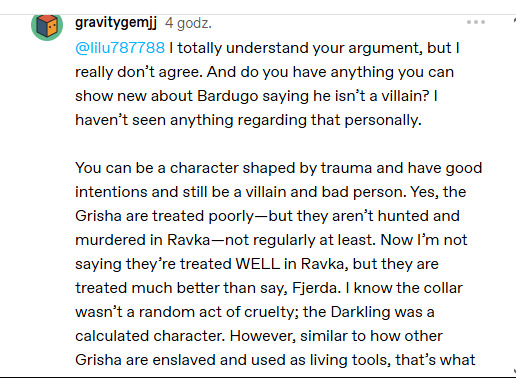
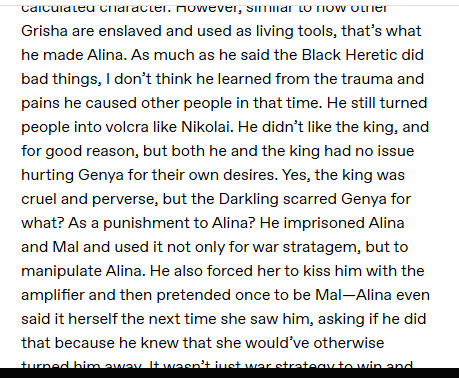
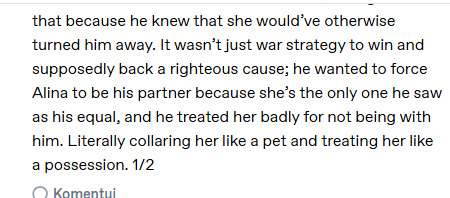
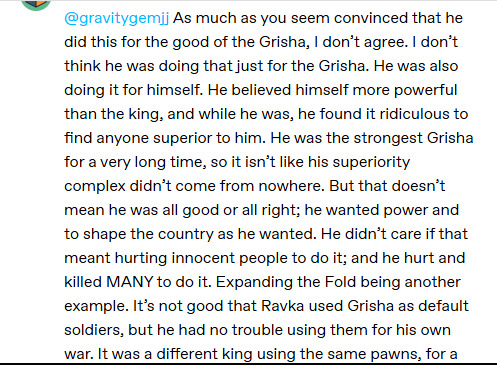
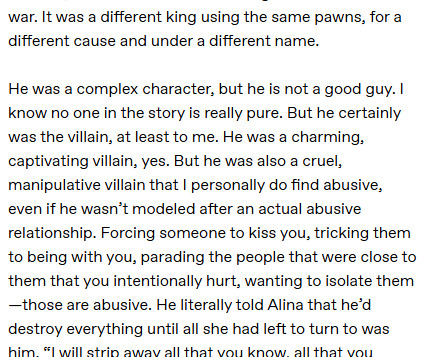
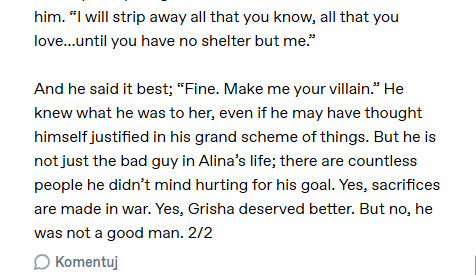
Ok, thank you for your comments :) @gravitygemjj , and I will try to answer it in the post, because you have really touched on many interesting topics.
The first is evidence of what LB said :)
Apart from her words, I am not saying that Sasha is ONLY a good character, no, I realize that he can do bad things, but, it is important to remember that Aleksander is a character whose moral complexity makes it difficult to assign him a clear label of "bad" or "good". It is this inability to simplify his motivations, actions and emotions that makes him the perfect example of a morally grey hero. Not because he balances between good and evil in a random way, but because his decisions grow out of specific experiences, traumas and calculations, and not from pure lust for power or idealism detached from reality. Aleksander is someone who has observed for centuries a world full of violence, betrayal and systematic cruelty towards the Grisha – people he not only understood, but also protected, because he was one of them. His actions are not motivated by a selfish desire for domination, but by a deeply rooted belief that only force – real, sometimes ruthless – can ensure the survival of his people. From this perspective, he can be seen as someone who makes difficult decisions where others do not dare to even look in their direction, such as Alina or Nikolai.
What makes him human is the fact that despite this armed calculation, he still carries deep emotions. Love, longing, fear of loneliness, and above all, enormous fatigue, not only physical but also moral. He is not a monster devoid of feelings, but a man who knows that hope often loses to the brutality of the world. And yet he tried to protect it – first for the Grisha, later for Alina.
You also have to remember that his moral greyness does not result from a lack of principles, but from their reinterpretation in a context where the classic concepts of good and evil are insufficient. In a world where "good" is often passive and "evil" acts with impunity, Sasha chooses action. Sometimes brutal, sometimes on the verge of what you might consider ethical, but always laced with something more than ambition - a sense of responsibility and a desire for justice. He is not a flawless hero, I never wrote that, nor an antihero who glorifies evil - this is also very important in understanding him. He is a man who understood that sometimes there are no good solutions, only those that will bring the least suffering - here, for example, Genya. And if he had to pay for them with his own humanity, he was willing to do it. That is why, paradoxically, in this mixture of light and shadow, Aleksander is a character not only morally grey, but also morally honest - towards himself, his beliefs and what he loved. He doesn't hide behind beautiful slogans about peace, brotherhood and that now we have to bury old quarrels and move forward, no, he knows that this is an illusion and painfully stupid, youthful ideals that have no support in such a terrible world in which they live. Leigh knows this, which is why I'm also posting screenshots of her statements. She also doesn't see him as only good or only bad, and this automatically falls into the category of morally grey. Additionally, as you will notice on one of the screenshots, she clearly said that she justifies Sasha more than Kaz, who is motivated only by revenge.



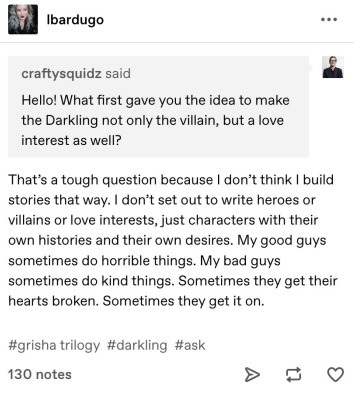
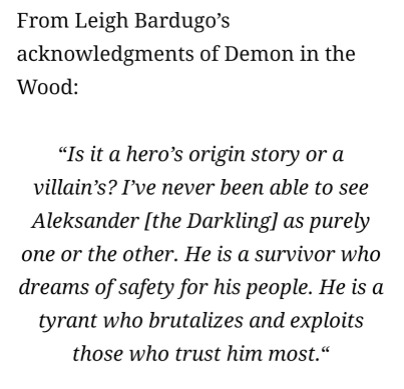
Another thing is persecution.
Your claim that "the Grisha weren't treated that badly in Ravka" may seem normal at first glance, but in reality, with those words you've shown in a very dangerous way the frequent trivialization of persecution in this fandom. You've suggested that there is a scale of suffering where, as long as people aren't actively being hunted or murdered in the streets every day, at every moment, we can somehow ignore their pain. This kind of reasoning has been used many times in our world to justify injustice, to remain silent, to deflect, and to justify a superior thesis.
But unfortunately, things are different, the Grisha were not free in Ravka. They were not safe either. And they were not seen as people in their own country, even by people who claimed to be their defenders.
Yes, maybe they weren't burned at the stake in Ravka like in Fjerda. But that doesn't mean they were treated with dignity. They were the property of the crown—the Lanstov dynasty. They were soldiers, weapons, tools to be used and discarded. The Second Army was not created to worship Grisha’s power—it was created to control it. They were tolerated only because they were useful. And the moment they stepped outside the box or became inconvenient, they could be betrayed, a nearly cyclical occurrence throughout the hundreds of years of Sasha’s life and even before his. Even their status couldn’t protect them from being handed over to enemies or captured and sold into slavery while traveling the borderlands of their own country. And what about fear? The constant fear that your power, your existence, made you something to be hated, experimented on, hunted? Shu Han kidnapped Grisha for experiments that defy all morality. Fjerda killed them as if they were witches or monsters. Even in Ravka, they were treated with suspicion and contempt. And only because of Sasha did they have some minimal rights. But beyond that? No right to live on your own terms. They were kept apart, trained from childhood, and told who they could be.
Isn’t that violence too?
Because violence isn’t always loud. It’s not always blood on the pavement. Sometimes it’s quiet. Sometimes it looks like… a uniform, not chains. Sometimes it’s being watched, judged, hated — without being given the chance to just be. Sometimes it’s the knowledge that even people who claim to care about justice will never understand the cost of your survival.
Now imagine telling someone in that situation, “But look, it’s not as bad as it was over there, they hate you here and someone might kill you someday, but at least they’re not burning you at the stake.”
You know that’s pretty much what people said to Jews in pre-war Europe, before the genocide became impossible to ignore. It’s the same thing people say to LGBTQ+ communities now — “you have some rights now, don’t complain, what more do you want?” This was whispered in countries like Poland, my own country, where my fellow countrymen were treated like second-class citizens until 1989! Where people were expected to quietly endure systemic erasure because, well, they were no longer actively being murdered. It wasn’t Katyn being done to us every day, but people who demanded their rights were actively suppressed by the communist authorities.
I have to admit that this hit me hard and you have to remember that freedom is not just the absence of death. It is the presence of dignity. Equality. The right to exist without fear. And the Grisha didn’t even have that in Ravka! They were exploited, sacrificed and forgotten unless someone like Aleksander fought for them. Why? Because Aleksander saw the truth. Not the convenient version, but the real truth. He knew that the Grisha didn’t just need protection. They needed power. They needed autonomy. And yes, he made mistakes, terrible mistakes. But he did what no one else had the courage to do: he looked at what the world was doing to his people and said nothing more. And those who judged him, like Alina, Nikolai, the nobility, never once lived in the same fear that he did. Never once did they feel hunted, trapped, broken. They benefited from the systems he tried to dismantle, even as they condemned him for the way he fought them. So no, we can't write things like "things were better here than there." Because that's the language of people who have never lived in fear. That's the voice of privilege, comfort, or ignorance. If someone lives like a weapon, not a person, then their suffering can't be measured in degrees. And if we're going to talk about it, we have to talk about it honestly and empathetically. Nothing less.
Collar –Your claim that Aleksander putting the collar on Alina is the same as the other Grisha who were enslaved or used as tools is a deeply flawed comparison, and one that completely ignores the circumstances, urgency, and stakes of what was happening at the time. The collar was not an act of cruelty. It was an act of desperation. A calculated decision made in the face of imminent doom. You forget that at that moment Alina did not fully understand the reality she was entering. She believed that destroying the Fold would solve everything, that peace would magically come, that the armies would lay down their weapons, and everyone would unite and say, "Well, we are friends now." But that was a naive claim from someone who does not know reality, and it shows that he is not fit to be a leader. It was a fantasy born of youth, of idealism, not strategy. Aleksander knew the truth. He knew that Zlatan, Drüskelle, and the Fjerdan army weren’t just going to politely back down. He knew they were planning an ambush, not just to kill Alina, but to slaughter every Grisha and tear Ravka apart. If Aleksander didn’t intervene, there would be no Ravka left to save. Fold would be gone, yes—but so would every Grisha who stood next to her. As would every civilian who got in the way of this war. The country would fall to pieces. Because do you think Zlatan and Fjerda would look at who stood in their way? War destroys everything.
When a nation falls, it’s never just the soldiers who die. It’s the children. The families. The common folk, taken prisoner, executed, wiped off the map. It wasn’t just power at stake. It was survival, for Grisha and Ravkan alike. Sasha didn't have the luxury of choosing between good and evil, he only had the choice of the greater or lesser evil. He chose the lesser. The destruction of Novokrybirsk may seem cruel to you, but if it hadn't happened, many more people would have died, hundreds of thousands, maybe even more. So no, it wasn't the same as enslaving Alina. She hadn't been turned into a living weapon to serve someone's ego or greed. She was a Sun Summoner. She had the power to tip the scales between life and death for thousands of people. Aleksander wasn't controlling her for personal gain, he had to use her power, immediately, because there was no time left to convince her, to hope she would see what he saw.
You can say it was wrong. You can say it was harsh. But call it cruel? To compare it to the systematic abuse and dehumanization of the Grisha in other nations is not only wrong, it is unfair. He was trying to stop that exact fate.
If he hadn't acted, the Fold would have disappeared and blood would have taken its place. Death. Subordination. The complete extinction of the Grisha. He hadn't put that collar on Alina because he saw something in her. He had done it because she didn't yet understand what the world really was and there was no time for her to learn it the hard way. So no, it wasn't kindness. But it wasn't evil either. It was a burden that only someone like Aleksander could bear. And it saved lives, though no one would thank him for it.
Genia - The reason the Darkling punished her is actually quite simple. In the context of Ravka's political and military structure largely based on tsarist and early imperial Russia of the 17th and 18th centuries, desertion was considered one of the most serious crimes. Even in the 20th century, during World War II, countries including Russia introduced extreme consequences for treason or abandonment of duty.
Genya not only abandoned her position, but actively turned against the Second Army, siding with those who worked directly against the survival of Grisha and Ravka. This was a betrayal at a time when unity and loyalty were matters of life and death. Aleksander, as a commander and defender of a persecuted people, made a decision in line with the strict discipline common to his role and the era that inspired the world of Ravka. Furthermore, as you well know, Genya began shooting Sasha at some point, so his Nichevo'ya, bound to him by merzost, saw Genya as a threat, and their instinct was to protect him—not out of loyalty, but out of self-preservation. If the host died, so did they. Even if Aleksander tried to stop them, their goal would remain the same: eliminate any threat to their existence, which meant protecting him at all costs.
Another thing. Before you condemn Aleksander's actions as extremely manipulative, keep in mind that other characters also crossed the line when it came to Alina. For example, Nikolai the "white savior" kissed her without her consent. It was portrayed in a more light-hearted way in the story, but it was still a moment where she was disrespected. On the other hand, Mal repeatedly tried to reduce her to someone she wasn't, he wanted her to remain ordinary, to dim her light, and often treated her more like a servant than a partner. Remember the fact that he wanted her to be his donkey?
So if you're going to hold Aleksander accountable for the power dynamics and choices he made, you have to be just as honest about the flaws of others. The difference is that Aleksander saw Alina as his equal, he didn't want her to be inferior. His actions were flawed, yes, but they were born out of desperation and a deep belief that she was the only person who could truly stand by his side. And that's unfortunately true. Speaking of manipulation, let's also look at how she was manipulated by Baghra, who lied to her about how Fold was created. She never told her the truth. She always convinced her that the only way out was to kill Aleksander (by the way, she's a great mom, right?). Mal was also destroying her from the inside, he didn't want her to be Grisha, he humiliated her every time she felt better. So if you condemn Aleksander's behavior, I assume you condemn them too?
To reduce his motives to a simple lust for power misses the depth and tragedy of his character, because it does not automatically translate into a superiority complex. His belief that the monarchy is unfit to rule was not born of arrogance, but of centuries of watching Grisha being used, betrayed, and abandoned like tools by kings who valued them only as long as it was convenient. He had survived betrayal after betrayal, purges, massacres, and slavery, and the one constant truth he had learned was that no one would protect Grisha unless he did. Was he doing this for himself as well? Of course, it was simple, he was Grisha too. Their fate was his fate. Their pain was his pain. To claim that he “didn’t care” about harming the innocent suggests that he acted thoughtlessly or cruelly for the sake of cruelty, when in reality every move he made was calculated within the grim logic of war. You talk about expanding the Fold as if it were an act of mindless evil, but what you call cruelty, others might as well call it a last resort. Ravka was falling, the Fjerdans were on the brink of slaughter, and the Lantsovs were playing politics while people like Zlatan were arming foreign soldiers to invade and divide the nation. Aleksander didn't expand the Fold out of bloodlust. He did it because no one else was willing to make the sacrifices needed to actually save Ravka. I've written about this before, so I won't elaborate.
I think you're missing an important distinction here. It's true that Aleksander used the Grisha in war, but the context is very different than how the monarchy treated them. Under the king, the Grisha were reduced to little more than tools - I've already mentioned this - expendable, controlled, and forced to fight without any regard for their well-being or autonomy. They were being used by the monarchy to maintain power, with no recognition of their humanity.
Aleksander, on the other hand, was fighting for the very survival of the Grisha. He saw that their rights and dignity were worth fighting for. This wasn’t a simple takeover of power. This was a desperate attempt to protect them, to give them a future beyond being pawns in someone else’s game. Yes, Aleksander was ruthless at times, and he certainly made decisions that led to suffering. But let’s be honest—when the only system in place was one that ruthlessly oppressed your people, wouldn’t you take extreme measures if it meant there was a chance to give them a life beyond fear and violence?
The war Aleksander was fighting wasn’t just about taking control—it was about the survival of the Grisha in a world that saw them as inferior, as expendable. This is not an excuse for everything he did, but it is important to understand the difference between using the Grisha as tools in a war that was ultimately about their destruction, and using them in a war that he believed was the only way to ensure their survival.
You also have to understand that this was a civil war, and that like any civil war, there were no easy answers. Aleksander’s fight wasn’t just a fight against foreign invaders—it was a war against the very system that had betrayed him and his people. The king wasn’t some benevolent ruler who wanted peace for all; he was a man who continued to exploit the Grisha for his own gain, just as others had done before him. Aleksander was fighting for something else, even if his methods were harsh. So while it may seem like a repeat of the same old cycle to you, Aleksander’s motives weren’t simply power; they were a response to centuries of oppression. The war he was fighting wasn’t just about conquest; it was about trying to break free from a system that had never cared about the lives of the Grisha.
The last thing, and the most beautiful—“Fine. Make me your villain”—those words aren’t just an expression of anger or frustration; they reveal the depth of his emotional turmoil and self-awareness. These words come at a crucial moment when he realizes that Alina sees him as a threat, as someone who stands in the way of her ideals. But instead of pushing her away or retaliating in a way that could further alienate her, he accepts the role she has given him, showing an almost tragic level of sensitivity. I can clearly see you flattening out these words, but you have to understand that his willingness to be seen as a villain, even if it means losing her, speaks volumes about his understanding of the world they live in. Aleksander fought for the survival of his people, the Grisha, and yet he knows that in the eyes of others his actions can make him look like a tyrant. This line is his admission that sometimes those who stand up for what they believe in, who fight for change, are often labeled villains by those who cannot understand their motives. It is his acceptance of that label—the realization that in order to protect the future he envisions, he may have to bear the burden of being... misunderstood. I think in many ways this moment highlights his tragic nature. He doesn't want to be a villain. He doesn't enjoy the pain he causes. But his sense of responsibility, his desire to protect his people, and his fear of losing the one person who understands him drive him to take actions that make him seem monstrous. But for Aleksander, it's not about being a villain; it's about doing whatever it takes, even if it means sacrificing his image and being left alone in the end. It's an overall incredibly complex and human moment, showing that his fight was never about power for power's sake, that it was about survival, love, and the desperate hope that Alina would one day see more than what was on the surface. That's why Aleksander is such a beautiful character and the best in the Grishaverse.
#shadow and bone#aleksander morozova#the darkling#pro darkling#shadow and bone tv#alina starkov#darklina#darkling#ben barnes#sun summoner#anti grishaverse#kaz brekker#six of crows#anti nikolai lantsov#anti malyen oretsev#anti baghra#grisha trilogy#genya safin
64 notes
·
View notes
Note
Paul Atreides x reader? Where the reader does not believe in the prophecy of the Lisan-al-Gaib or in any god or Messiah that they say will come, to which Paul is interested in her but also feels anger because the reader does not show fear or submission, and when inquiring about why she has no faith in anything she reads or gods is because she went through many horrible things and when she prayed for it to be a nightmare but it never happened, and that's why she believes in nothing but herself.
thanks for the request! sorry if i haven’t answered sooner :(

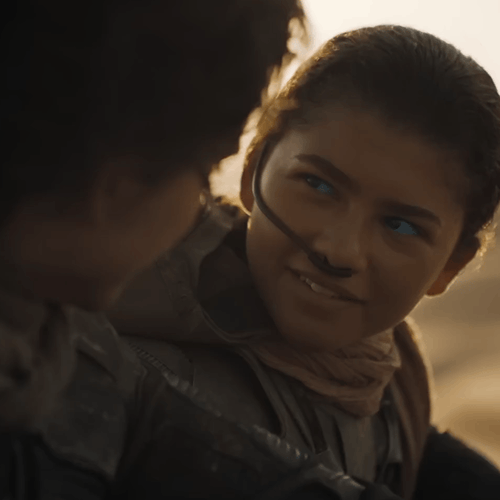

PAUL ATREIDES x yn.
your people lived on arrakis under one name: the fremen. people who have inhabited arrakis for many millennia, originally arriving after an interplanetary diaspora.
your planet became the center of immense interests of the empire following the discovery of the powerful drug called melange or spice, capable of significantly extending the length of human life and increasing.
you have been trained in guerrilla warfare since childhood, reason why you're considered among the best fighters in the universe, the only ones capable of holding your own against even the emperor's ferocious sardaukar.
people can comfortably call you interstellar nomads who follow a particular philosophy, people who live together in desert tents and who are more like a big big family or army.
therefore, you don't hide the fact that you get along very well, despite the fact that fremen have challenging, ambitious characters, and you often want to prove our superiority by fighting or calling sandworms.
if someone has already heard the famous prophecy "blessed be the creator and his water" well, that's you, these are the fremen. that's your prophecy or the thing people think you believe in. or at least, your people believe in.
you worship shai-hulud, the sand worm, a gigantic and dangerous creature that populates the deserts of arrakis and is the source of the spice cycle. your religion, like almost all those of the primitive worlds of the empire, was profoundly influenced by the bene gesserit missionaria protectiva.
if you ask stilgar, he will answer you by saying he believes in the arrival of the messiah, of the lisan al-gaib. so please, don't ask stilgar.
lisan al-gaib, in your fremen language, "the voice from the outside world".
in later use the name messiah specializes to indicate the "anointed one" par excellence, sent as a savior of the fremen, the chosen people, and to turn the desert into the green paradise it used to be. this is how stilgar would happily explain it to others.
bullshit.
the biggest lie you've ever heard.
you have waited ages for the messiah, and the only conclusion you managed to get was that even foreign people made fun of you all by saying they were the famous messiah you had been waiting for. really funny, right...
"the walker of the golden path" they say, just they don't know how much you have suffered or how different you feel about your people's adamant beliefs.
you know paul since a few weeks, and you hated every second of it, and you knew he did too.
at first you avoided him, dodged him or threatened him with your eyes as if he were an harkonnen. or, if you were in a bad mood, you ignored him completely, especially when he entertained stilgar with inappropriate and absolutely not funny jokes but that made the whole for-dinner-tent laugh.
you knew that everyone was at his feet, that they would even lick the sand he walked on.
you often heard your fremen friends talking or chatting about him, and you could have sworn some of them even wondered out loud of it would be to have sex with him.
you had never thought of paul as someone to have sex with, mostly because you hated him on principle.
for the first week you loved showing off your fighting moves when he looked, or throwing barbs at him to shut him up.
you knew that he was intimidated but also angry towards you, that he was curious about your people, and therefore you could show yourself superior anyway. you wanted to crush it like a desert fly and rejoice while it dies under your sole.
then, everything changed.
it was afternoon, and the wind was gently blowing, but not enough to make the sand rise.
he was a little too snuggled up next to you, on the highest dune you could reach from the fremen camp.
at first, you didn't even like the idea of starting a conversation, but paul was the one who talked first.
he told you about his visions first, about his nightmare correlated, about the mental torture he had to kneel upon when he used to live on caladan, because everyone thought he was the kwisatz haderach.
he told you about his training, his father's death and how he felt so alone, abandoned by the little people he loved and betrayed by the ones he barely knew.
something about it woke up a new feeling inside your chest. you felt understood.
and he was not there forcing you to go on your knees and pray the messiah and his rise to power.
he was simply chatting, his eyes almost tearing, playing with some sand in his right hand.
he wanted to understand you, to understand why you were the only one who refused to believe the prophecy and yet the only one who captured your attention.
your mind returned to the morning where a few of your friends wished to have sex with him, but right in that moment, when the sun was melting under the dunes, far away, you could only wonder how plump and soft his lips could become against yours.
that same evening, you got confirmed paul atreides was the best kisser you had ever known.
in your tent, with a slight scent of spice and body
skin and sweat, he held you close as if you were
his only lifeline, as if you were about to become
small microscopic grains of sand, and he would no longer be able to hold the right ones in his hands.
you stood there, under his slim and perfect body, stroking his curls in a slow and sleepy gesture, until he closed his eyes and let his cheek rest against your breasts.
messiah or not, you believe he was the love of your life.
#timothee chalamet#timothée chalamet#timothee chalamet x reader#timothee x y/n#timothée x reader#paul atreides x you#paul x reader#paul atreides x reader#paul atreides#dune movie#dune part two#&. PAUL ATREIDES#&. PAUL ATREIDES x yn#&. PAUL ATREIDES x reader
179 notes
·
View notes
Note
Damian would be the first of his brothers to start a family (marriage and planned kids) and Tim would be the last. Probably gets an accidental pregnancy by the time Damian's kids are in middle school or sum
Also, Jason is a girl dad and the oldest is his carbon copy, not just in physique. I don't know why people have Dick as the girl dad when it's obvious Jason was born to have daughters, he exudes girl dad energy.
Dumb parenthood headcanons because i'm on the mood. Thoughts?
-Selene 🌚
Why do you hate me so much— you're supposed to be my soulmate, not my arch nemesis 💔💔 I will not tolerate girl dad Tim slander around here. And we aren't going to pretend TIM would be the one doing anything by ACCIDENT, ma'am, t h a n k s.
Jason is 100% a girl dad, yes. Dick could have both, ngl — he would be over the moon thrilled either way. Damian would have more than one — he'd probably have like.. three, at least — I see two girls, one boy, the son being the oldest and basically drilled every day on how to protect his sisters 😤
Tim's daughter would actually just be an asshole. I don't mean "mean girl" vibes either — she'd be very similar to how Bart was in school, in Impulse. Blunt, literal, introvert, comes off as an asshole just trying to exist — she's basically 90s Bart mixed with 90s Tim because she'd also have warmer qualities when she got around to it.
And we all know damn well there would be one person for each family that would almost get killed because their child has one of those toddler crushes 💔 Roy, Kon ( 'wow.. just like his did.' — said tims partner, much to his wanting to die. ), Wally, Jon ( fuck you, dc. ).
Dick's daughter would somehow end up hating everything related to gymnastics, dance, theater and cheerleading. His son would end up influenced by Jason and end up writing a book. But, as sad as he'd be initially, he would support literally anything they wanted outside of murder and criminal activity. Worlds biggest fan of his kids. Would be the one crying on their first day of school. WOULD be the pissed off parent slamming doors when he got called in because his kid is in trouble for defending themselves.
Damian's children would be so well behaved? And i don't mean terrified, scared to breathe wrong. They would be so fucking well mannered and sweet. Because they have their dad's manners and belief on respectful, meanwhile his partners sweetness and soft heart. Surprisingly, not as suffocatingly smothering and hovery as you'd think he would be. Because his kids would know how to take care of themselves. Not the same as he did, which he would absolutely never do, but self defense would be a must. And, he trusts them.
Jason's daughter would simply be a menace that's a complete mix of her environment. Not touching a single piece of technology, out of his supervision, until she's 16. No tech household — we play board games, read books and play outside in this house. Probably takes an interest in bow and arrows before even asking her dad about his weaponry ( i feel like i shouldn't HAVE to clarify this but obviously no guns around his kid until she's older and can be sat down, talked to, educated, etc. ) She would just nod along, seeming interested before just:
uh huh.. uh huh.. mhm.
are you even listening?
yeah, it's interesting. hollow points are cool.
that's your biggest interest?
yeah.. oh hey, can uncle Roy take me to get a bow?
are you fucking kidding me ( he would be grateful she didn't WANT a gun but also want to strangle said uncle. )
Tim's daughter abhors computers, caffeine and staying up late. She would 100% be a nerd. Straight A's, good schedule, clubs, extracurricular. However, everyone would probably assume she's just that — a nerd. passive. etc. Until she gets called in for breaking someone's finger and Tim's just standing there, in the office, like:
okay, why?
he kept touching me
and did you warn him?
three times!
tim, looking at the principle; it sounds like he deserved to get that finger broken, so what's the problem?
Damian's children are very very very animal oriented and have asked for every pet known to man.
Dick's kids just like to fuck with him, ngl. Probably Wally's fault.
Jason's daughter can and will lie directly to his face, with zero tells and he's proud but also very terrified for what that means.
Tim's daughter has surpassed every achievement he's ever had outside of vigilante work. Grades, skating, hacking, etc. Even if it's something she hates, she is somehow flawlessly better than him and he could not be prouder.
Tim's daughter probably doesn't like Jason's. Dick's kids are probably wary of Jason's AND Tim's daughters. Damian's kids get along with everyone, somehow. Varying ages, obviously, but the older ones are still very protective of the younger ones. Which would order as: Damian's, Jason's, Tim's, Dick's.
Damian wants a family. Jason wouldn't say no to kids. Tim wants something of his own. Dick hesitates because of how much of himself he gives to others.
They would all be generally hesitant because the world is a shit place.
Tim's daughter has a WILD obsession with glitter to the point he has become actually traumatized.
One of Damian's kids eats meat, much to his disappointment.
Dick's son drew him as a hero before ever learning anything about him and he nearly melted.
Jason's daughter quietly started learning irst aid and light medical training when she was around 15 after seeing him come home hurt. ( hate me but I always picture him as a single dad otl )
Tim has never actually hated anyone more than his daughter first partner. Not because it's his daughter but because '...she has taste for shit, how did this happen?' ( and his partner just.. staring at him like; wanna think about that, babe? )
Jason refuses to date until his daughter is much older, mid to late teens because he doesn't want to go through the replacement or forcing a figure on her phase. Plus, he'd be SO cautious of who he brought around her.
Dick spoils his kids beyond belief. Like. The type to constantly remind them of why and how he can do these things for them so they don't turn into little goblins.
Damian is the type of parents to teach his kids very young how to save, have multiple skills, etc. But not the.. weird tiktok mom forceful kind of way. He would be pretty gentle, ngl.
Jason would 100% end up with the daughter who's around audhd.
Tim's daughter is probably either tone deaf or colorblind and he doesn't learn that til she's like 15 and looking at him like omg dad isn't this blue so pretty? And he's like, squinting at the color: ...come again?
Dick has watched soooooooooooo many hair tutorials. He owns so many combs, brushes, clips, ponytails, headbands, bows— he prides himself on being able to do absolutely anything asked of him.
Damian, despite WANTING a family, cries when he learns they'll be having kids the first time. Like. Out of sheer joy but also already proud of them.
48 notes
·
View notes
Text
Watchers and their Power - TSBS
Been wondering for a while about what we know of these self described "Watchers" of the TSBS universe.
Wall of text ahead
As in, Golden Freddy in TSAMS is near omnipotent, and only rejects the title of god out of principle.
Puppet as a Watcher without her original dimension is still crazy powerful and considered immortal until giving away the details how to end her own cycle.
So... why is the Charlotte Emily of EAPS, seemingly powerless?
Charlotte revealed she is indeed a Watcher. But does not hold same power as Golden Freddy or Puppet.
I think that relates to they AGE of each dimension. Charlotte merely awakening one day knowing her purpose as a Watcher for a dimension, that others realize is a new addition to the multiverse.
The dimension Sun and Moon origin from has been declared a pillar by Golden Freddy, it is a source of a lot of the multiverse concerning the TSBS. As a foundation it has had more time to grow and develop. Golden Freddy even had mentions of a Watcher before himself, transferring their experience and power to him when his turn to take over the duty of watching over the SAMS dimension.
Puppet found herself earning power beyond her belief, after her death. I do believe there was a mention of a lack of mentor in her dimension, while Golden Freddy had to earn his spot under the current Watcher before tasking over the position and the power it comes with.
Thus the prime universe, of which Golden Freddy watches over, has existed much longer than the other current TSBS dimensions presented. Just by having an active Watcher who had functioned long enough to give up his power to Golden Freddy.
While Puppet merely earned her powers "wildly", like a Watcher had been missing for a while. Leaving her without guidance before she began using her strings and threads to control everyone in her old dimension, until everything went bad.
Leading to Puppet running away to the prime dimension, where Golden Freddy could start mentoring her in her usage of her power.
So, once again, the question is, why is Charlotte Emily of the EAPS dimension so weak compared to Puppet? Or even Charlie, at this point.
Simple - The EAPS dimension is knew. That's its entire concept from the start. Though those who inhabitats the dimension seem to know its entire history, to know it's origin in the way any world does. It is still a fact that the EAPS dimension came into being, thanks to Ruin's actions.
It is new.
Thus, its Watcher, its Guardian, equally only exist with awareness but limited power. As Golden Freddy in his plots have revealed the power of a Watcher is inheritaged. The older a world, the more power through experience a Watcher has. Even Puppet's universe was based on the books, even if she had no existing watcher before her as a teacher or even holder of the power she suddenly inheritaged. A lot of things happened in that universe just based on the ever growing collection of books, most likely driving up the power of whatever Watcher might been there before Puppet.
Charlotte Emily in EAPS has the awareness of her position as a watcher, but in a world still new. Built from scraps and pieces, from the worlds Ruin destroyed. The power that builds up and gets passed on to the next Watcher at the sacrifice of the existing one, is a cycle that has only just begun in the EAPS dimension.
Puppet was an anomaly, a Watcher leaving her original dimension, and using her powers where ever she went. That makes Charlie an anomaly as well. Away from her home dimension, a place in no need of a new Watcher as it still has Golden Freddy, who seems to choose Francine as his future successor.
Charlie does not belong in EAPS, both by origin and by her power. Meanwhile Charlotte is that world's Watcher, without the power Charlie has gained from Puppet.
There's an entire system in this power of life and death between dimensions. And that's without even touching upon the Astrals and Star Powers, as it's been pointed out that Watcher power is not magic nor star power .
These are merely my observations and thoughts on the matter. And why I feel Puppet's powers should had gone to Charlotte before Charlie. Charlie is now left to a uncertain future. A Watcher of no world. Not her home dimension, nor Puppet's. While Charlotte exist as Watcher of the EAPS dimension. What is Charlie's future with this power? Unless she can hope to one day purify the mess Puppet's home dimension was left in.
Anyways, thanks for reading!
#PuffBlog#TSAMS#EAPS#The Sun And Moon Show#Eclipse And Puppet Show#Puffy Rambles#Ramble#Watcher#TSAMS Watcher#EAPS Watcher#Charlie Puppet#Puppet#Golden Freddy
37 notes
·
View notes
Text
Lenore Dove’s argument against the inevitability of the reaping is a representation of one of David Hume’s most famous arguments. Hume’s Problem with Induction goes like this:
Just because something has happened, isn’t proof it will continue.
In more technical terms, it’s:
“Thus, not only our reason fails us in the discovery of the ultimate connexion of causes and effects, but even after experience has inform’d us of their constant conjunction, ’tis impossible for us to satisfy ourselves by our reason, why we shou’d extend that experience beyond those particular instances, which have fallen under our observation.” (A Treatise of Human Nature, David Hume).
Concluded by:
“When the mind, therefore, passes from the idea or impression of one object to the idea or belief of another, it is not determin’d by reason, but by certain principles, which associate together the ideas of these objects, and unite them in the imagination.” (A Treatise of Human Nature, David Hume).
This is one of the most famous philosophical arguments, and Lenore Dove explains it perfectly.
The sun has always risen
Therefore, the sun will rise tomorrow
Although this seems like a strong argument, it’s not a valid argument. It’s incomplete. It lacks reason, and as Hume puts it, it “extends that experience beyond those particular instances”. The sun coming up yesterday doesn’t mean it will come up today. That’s just a pattern. It’s self-fulfilling. If you’re curious, I highly recommend this video by Unsolicited Advice. I’ve recommended his videos before, and he covers this exact argument really well.
In Lenore Dove’s version of the argument, she knows it’s not valid. She points it out when she puts it like this:
The reaping has happened every year on Haymitch’s birthday
Therefore it must happen on Haymitch’s birthday
Just because the reaping has happened in the past doesn’t mean it will continue. The only argument to be made would be one of an imagined projection. It’s not logically sound, just like the sun rising.
If you’re curious about Hume’s argument, Stanford Encyclopedia of Philosophy has a wonderful breakdown here.
#you dont understand how excited hearing her lay this argument out made me#i was hopping around in my kitchen#sunrise on the reaping#haymitch abernathy#sotr predictions#thg#sotr#lenore dove
47 notes
·
View notes
Text
Lelouch's relentless search for purpose in life
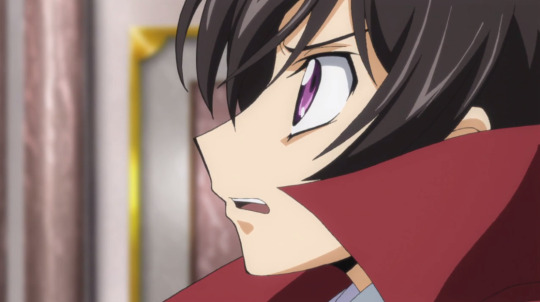
I've previously talked to you about Lelouch's trauma through the enneagram to explain why Lelouch refuses to open up and trust others and insists on doing everything alone to feel self-sufficient and strong. I've also used the enneagram to explain that Lelouch has locked himself into a protective shell and is uncomfortable feeling vulnerable because of his trauma and his upbringing in Darwinian values in Britannia. However, I haven't talked to you directly about one thing that is very important and perhaps because it is so obvious I have overlooked it until I stumbled upon a small thread on Twitter.
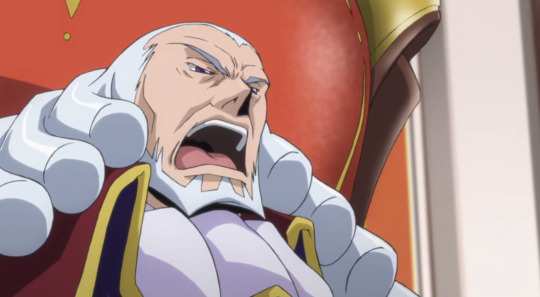
In the last conversation Lelouch has with his father, Charles nullifies the meaning and value of his existence by telling him: "But you're dead. You've always been dead, from the moment you were born. Who gave you the fine clothes you wear, a comfortable home, the food you eat, and your own life? I gave you all of that. You are nothing to me because you have never existed." At that moment, Charles kills Lelouch in symbolic terms, causing him enormous psychological and emotional damage from which he never recovers.
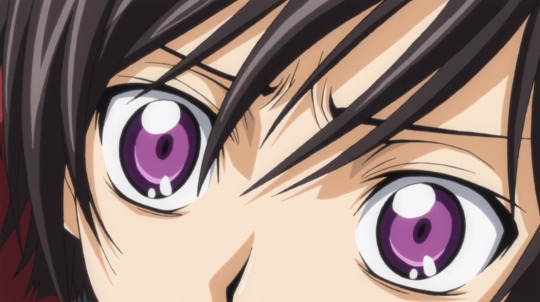
We have this flashback in episode 7 of the first season and later Lelouch threatens CC with suicide if she does not let him go to face his sister, Cornelia: "Until I met you, I was dead. A corpse that existed behind a false appearance of life, a life in which I did nothing real. I experienced the emotions of living day to day as if I were a zombie, with the feeling that I was dying little by little. And if I have to go back to that, then I prefer… [And he places his finger on the trigger of the gun]." The series connects those two scenes through a Dutch shot focused on Lelouch's gaze. The Dutch shot is a steep horizontal tilt shot that is used to indicate instability or danger or that something is not right. In this case, it warns us, on a superficial level, that Lelouch has felt dead since his last meeting with his father and that he has been fighting against that (unfounded) belief and these negative feelings and, on a deeper level, that this is a wrong and harmful belief of Lelouch's that has been poisoning his mental health ever since.

(It's sad to compare the two shots. Little Lelouch's eyes show deep pain. As the Bart and Lisa Simpson meme says: it's the exact frame in which his heart broke. Teenage Lelouch's eyes, on the other hand, are empty. A dead look.)
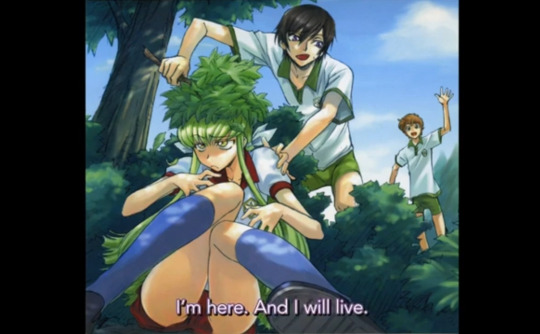
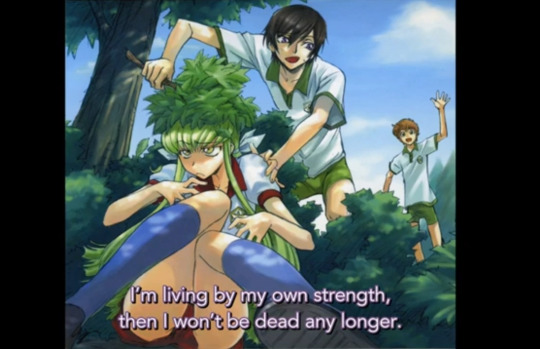
There are several moments in the story that give us an idea of the young prince's struggle. For example, in the first Audio Drama, "The Uninvited Prince," a young Suzaku rescues Lelouch from some children who are beating him and reproaches him for not standing up for himself and disregarding the hospitality his home provides him and his sister, to which the child Lelouch replies, "I am here and I will live. If I live by my own strength, then I will never be dead again." Little Suzaku, of course, finds Lelouch's statement absurd and just thinks he is a strange child. But this response reflects the boy's insane desire to be self-sufficient (to the point of rejecting the help of others) in order to feel that he is alive (remember that Charles told him that he is alive because he has given him everything he has).


We also have a Picture Drama (I'm sorry I don't remember or have the exact number of the PD, but if it's part of the alternate universe, we can ignore it because they are different universes that shouldn't be mixed) with a monologue by a teenage Lelouch: "I've made a vow to use the strength I have to save Nunnally. That will be the proof that I exist in this world."
youtube
These words evoke in me a part of Lelouch's song "Back to Zero" (for the fantastic Code Black album in Ashford) in which our hero sings: "Oh! Can you hear me? This fight is how I know I'm alive."
That is, Lelouch tries to prove his father wrong by looking for a purpose to live that reaffirms his existence and, in principle, Lelouch finds it in Zero and the rebellion since they are the means he has to destroy Britannia and create a kind world for Nunnally. And that's why later on he abandons Ashford Academy, the Zero mask and his friends and gives in to depression (in the future, I'll talk about this moment in more depth in another analysis). Then his goals change and his motivations are reconsidered for a series of reasons and events that I won't stop to explain here, but I will point out that I find it interesting and moving how Lelouch goes from clinging to a purpose in life to giving up on it and dying, in order to fulfill his new goals, obtain results and atone for his sins (the magic of a powerful script and a narrative arc, Larry).

Also, all of this explains why Lelouch lost his temper in the season 1 finale when Suzaku yelled at him that his existence was a mistake and that he needed to be wiped off the face of the Earth. Not only did it bring back memories of Vietnam for Lelouch, it was another important person to him who was denying his existence. Suzaku's words hurt him because, as President Snow said in the Hunger Games trilogy, "the people we love the most are the ones who destroy us." I'm not sure if Suzaku knew what Charles told his friend since Lelouch never reveals his secrets to anyone (people around him, including his loved ones, find out on their own), but Suzaku certainly hit a sensitive button that mentally unsettled Lelouch.
Poor Lelouch. He just wanted his existence validated.
#code geass: lelouch of the rebellion#code geass#code geass: hangyaku no lelouch#lelouch#lelouch vi britannia#lelouch lamperouge#suzaku kururugi#charles zi britannia#Youtube
123 notes
·
View notes
Text
now i know
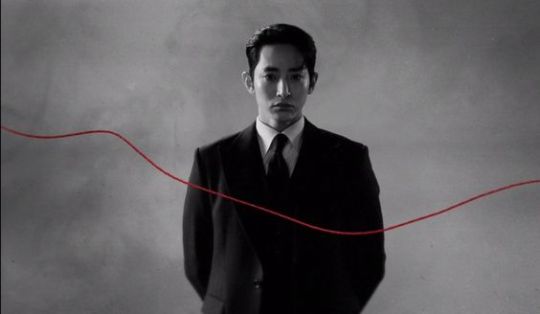
a/n: hello !! i know i literally fell off the face of the earth and i don’t know if i am fully back but i had the sudden power to write. i have several ongoing drafts that are unfinished, but this one might be the oldest. i wrote this after the first few eps of tomorrow aired. so it's only fit i come back w a joong-gil story!
pairing: park jong-gil x reader
warnings: mentions of suicide, self-harm
summary: park jong-gil has been working for jumadeung for a very long time, he had his principles and was strict in following them. that was until you came along. you were part of the risk management team that he hated so much, but he couldn't help but become curious about you.
.
he was feared and respected by all who worked in jumadeung. he was one the elite members, and he was known to be the most strict leader of the escort team. he portrayed no sympathy to the dead souls that are to be escorted, and he believed suicide is a murder. the biggest crime a person could commit against oneself. or so everyone thought. the number of suicide deaths were slowly but surely decreasing, thanks to the risk management team that are led by ko ryeon. he understood that deaths are increasing endlessly. but why would a person take such extreme measures only to feel the will to live after a few words of encouragement? it made his blood boil.
he wanted to avoid this team at all costs, but then you came along. you were young, full of empathy and love. joong-gil knew of the newbie that joined (through a course of unexpected events) and he found you quite annoying intriguing. when he heard about a suicide victim with a very high percentage on the red light app, he went to watch. he wanted to confirm his beliefs with his own eyes.
but when he reached there, he saw you talking to the writer, named eunbi, who was on the edge of the building. you were taking cautious steps towards her, trying to talk her out of it. how pathetic, he thought. but after looking again, he wasn't sure if those were the correct words to say. he was shocked to say the least. not because the writer jumped off, but because you jumped right after. you were reaching out to her, trying to hold her. you held her so tight, preparing for impact. can a reaper die? is what you thought as you waited for impact.
however, it never came. you never felt pain. on the contrary, you were feeling the air breeze softly kiss your skin. you looked up, and there he was. the seemingly heartless reaper, holding you in his arms. you couldn't keep in the shocked expression, neither can he. you then frantically looked around for eunbi. she was laying on the ground. no...did she die? "she's not dead." you heard a deep voice say.
he was still holding you, staring at you with his dark black eyes. "what? what..happened?" "i think i should be the one asking that?" you could hear the disbelief in his voice. why am i holding this woman?.."are you out of your damn mind?" he threw you on the ground. you grunted. "why would you jump after her? were you trying to die with her ?! you're insane?!! " you were taken aback by what he said, and before you know it – tears started forming. you tried to gulp down the lump in your throat, you didn't want to break down infront of him. he wouldn't understand anyways. the other team members catch up to you, checking if you're okay. you stand up, looking at joong-gil one more time before walking away from the scene, with your head hung low.
a few days had passed. he didn't know if it was the tears you were holding in, or the look in your eyes, but jong-gil found himself thinking about you more than he'd like to admit. he wondered why the pain behind your expression is imprinted in his mind. but he had work to do. shaking thoughts about you away, he got to work. he was going to catch a well-known mafia, and he knew it was going to be a tough one. he prepared backup and left. after a few fists and punches, he found himself on the ground, in pain. he had been stabbed. the mafia was injured too. he was strong. and he knew that he should have planned this more carefully, because he's in a bit of a trouble now.
the mafia got up, took out a knife and was headed towards joong-gil. but before he could do so, a hand yanked the knife away from his hand. Joong-gil looked up, only to find you standing infront of him, wrestling the weapons off the mafia. after a few punches here and there, you knocked him out. breathing heavily, you looked at joong-gil. you immediately noticed his abdominal injury.
you find a piece of cloth and walk up to him. "what do you think you're doing here?" he hissed in pain. "i don't think you're in the right state to be asking me that, i need your cooperation to stop the bleeding." he was reluctant but he obeyed. you tied the cloth around his injury, and put his arm around your shoulders, trying to pull him up with you. he grunted in pain as he stood up. "does it hurt alot..?" you looked at him, worried. worried?? why were you worried? joong-gil thought as he looked at you. maybe this is the way you are to everyone, he shouldn't get it confused.
"are you stalking me?" he said as you furrowed your eyebrows and moved your head slightly to look at him. "if you believe you're the center of the universe, you're mistaken" you scoffed. "then why are you here? helping me?" now your mind is blank. why did you save him? you were on a mission that happened to be near where the fight occurred. before you left, you heard grunting and breaking glass. as you came closer and saw who it was, your body started acting on your own.
..."because you're an important member in jumadeong. and it wouldn't benefit me to leave you to die here." he was staring at you with an expression you can't quite decipher — it was a mix of gratitude and playfulness — he wasn't used to getting help from others, especially not from the rm team. you finally reach jumadeung, but instead of leaving joong-gil to the guards there, you took him to the infirmary. "looks like only the mighty joong-gil got hurt today" you slightly giggled at this unusual scenario.
usually joong-gil would have a comeback ready, but this time all he did was stare. stare at you. why were you so kind to him when all he does is ridicule the rm team? there must be something wrong with you...was your death so horrible it messed up your brain even in the afterlife? well...he definitely guessed the first one right. "...can you stop rubbing it in my face, it's not like i jumped willingly off the roof-" shit. shitshitshit. "i didn't mean to-" he grunted as you threw him on the medical bed, turned around and left. he didn't realize that he said the last part out loud.
people in jumadeung ridiculed you for doing "too much" to suicidal people for as long as you can remember, but why do you feel your eyes burning with tears? why did that heartless leader have such an effect on you? you couldn't understand. you kept walking, almost sprinting, to get to the place you loved the most - a hidden roof garden that only you knew about (or so you think). you always went there when you needed to take a breather, and to let your tears fall down freely. as you opened the door to the garden, your tears rushed out of your (e/c) eyes, as you were unable to hold in your sobs. you cried your heart out, knowing well no one was there to see you.
but you were wrong. standing at the door, someone was holding onto to their heart, feeling immense pain. joong-gil felt like knives were stabbing at his heart, the air rush out of his lungs. he couldn't believe what he's seeing. that he was the reason that triggered it.
after a while, you had calmed down, your sobs turning into sniffles. you now noticed the spectacular view of the city, bright lights shining under you. you collected yourself, and realized that you had spent way more time than you should here, work isn't gonna work itself. joong-gil sensed that you were about to get up, and hid before you could see him. feeling pathetic for his cowardly action, he felt his eyes burning. me? crying? he didn't know his tear ducts were working at all, after too many years working in escorting the dead.
after that incident, joong-gil decided you were better off without him looming over you all the time. however, that's not how it was for you. what he said lingered, rather, took over your mind. you couldn't fathom why you wanted his understanding, why you wanted his dark eyes to look at you like you meant something to him. you decided to pile your desk with work to give no space for your racing thoughts.
.
but to their dismay, they both couldn't stop thinking about the other, both throwing themselves at work, like they couldn't handle the life moving on around them.
.
part 1 | part 2
#drabbles#imagines#scenarios#writing#fanfic#oneshots#tomorrowkdrama#parkjonggil#yoonjion#kactorimagine#lee soo hyuk x reader#lee soo hyuk#kactorscenarios#kactor#kactorsoneshot
89 notes
·
View notes
Text
When discussing the benefits but also the dangers of fantasy in TOH, it makes me consider how this ties into Belos’ bigotry, religious superiority, white supremacy, etc. Because I see how in the parallels to Luz and the depictions of his witch hunts as a ‘game’ he played as a kid, the show is getting into the thought process behind white supremacy and the like; Specifically, by suggesting that it comes from the same core principle of “I was born special, I’m a hero.”
Because think of it this way; I was born inherently better than others, it’s in my blood, I have to defeat evils? These aren’t unlike what white supremacists believe about themselves. After all, TOH is coming off of Harry Potter, which is criticized for the “It’s in his blood” trope with the protagonist.
This is foiled by Luz, who wants to believe at first that she’s special and things will automatically come to her because of it, but then Eda has to explain; Sorry kid, but if you want things you have to work for and earn them, just like anyone else. Some things can be attributed to luck on Luz’s part, but it’s not as if she’s blind to this and saying it’s ‘destiny’ (unlike someone else), plus in general we all have a bit of privilege in some ways.
And again, that ties back into Christian white supremacy, particularly the Puritans, who believed their colony would be a "City upon a Hill." That it’s their goal to enlighten people, or else root out the evildoers; You can see how this evolves into evangelicalism in the U.S. and the right’s obsession with anything new as satanic, even if it’s something like Elvis Presley or Pokemon (which Dana grew up with, coincidentally), or more recently, furries.
(No really, this actually happened I kid you not. It seems like an exaggeration but I swear it genuinely happened and it truly is absurd that it did.)
Anyhow I think that’s important, because it’s not just the message that Christian white supremacy is bad, it’s why people even believe and buy into these things to begin with. A lot of alt-right 4channers and the like fall into these rabbit holes because they feel cheated out of the implicit, unconscious promises of white supremacy and feel as if they’re owed something; So obviously women and PoC, the queers, the ‘diversity hires’ and affirmative action, this is what’s cheated them.
And you can see the connection between white christian ideas and how that can translate into a lot of fantasy stories, hence “It’s in your blood” and “It’s destiny,” as well as Isekai Colonialism; The idea that what if another world and its inhabitants just existed for you. These tropes are inspired by outdated ideas that Christian white supremacy, an outdated belief, has plenty examples of and sometimes even inspired.
And this is why it’s important to engage with these things critically and question them… But at the same time, Luz is still allowed to love Azura, it’s just about maintaining a critical eye and being self-aware of what you internalize and don’t. Hence her learning to differentiate reality from fiction and not become delusional; Hence King doing the same!
By making that connection, it does explain this type of bigotry by framing it in a way that viewers can actually relate to, even if they also condemn it just as much, if not moreso after understanding. It ties even the genocide with tropes like the dragon slayer, the endless horde of monsters you don’t ever have to feel bad about or question killing, or the DnD Evil Race; Which on their own, these stories aren’t necessarily in advocacy for genocide of course, some of them are just inspired by previous ones without making that connection. And most people know not to let it affect how they see reality.
Because it’s one thing to let yourself be petty and find catharsis against a genuine, extreme example who has gone out of their way to hurt you (those definitely exist, alas); But it’s another to actively search for people to feel angry towards, amidst groups unrelated to you, and provoke them until they give you that ‘justification’. Because you’re not responding to anything, you are the aggressor; In essence, you are performing a witch hunt, in a need to feel like a hero enacting righteous judgment.
Because you’re desperate for the power of putting someone else beneath you, which is what the mundane bully does, out of the belief this conversely translates into you being above others; Again, the ‘chosen one’ beliefs, the Christian white supremacy. And suddenly you better understand why Evangelicals raged over something as innocuous as the Pokemon games that Dana grew up with, back when they first came out.
So Luz understands; She does understand, better than some people, in fact. She understood the Collector. But just because she understands, doesn't necessarily mean Luz approves or excuses; She still has every right in condemning Belos because she never let herself go that far, and this behavior would be condemned even by those trying to make up for it; It’s why they try to make up for it. And the fiction Luz wants to happen for herself (which isn’t the same as the fictions one enjoys) isn't centered around there being hidden bad actors amongst the populace to constantly root out; Luz is only going to react, not act, and consistently, predominantly sees the best in others.
In the end, Belos latched onto Caleb marrying Evelyn, and then the Grimwalkers, and finally Luz, as a way of a proving a point to himself; That wiping out witches WAS in service of humanity, it would actually help them, by showing how he 'rescued' a human from temptation. I'm sure he genuinely loved Caleb, but in an extreme form of Luz's Wing it like Witches, at some point he subsumed Caleb's input and agency to instead make him into a docile trope to make decisions for.
And when Caleb didn't go along with that story, pointed out how it didn't fit the reality of the situation; Philip killed him! His priorities shifted from doing it for Caleb's sake, for the sake of HIS fantasy; He saw an opportunity to live out the Witch Hunter story and it mattered more to him than actually helping someone, or realizing in relief he didn't have to.
Hence the Titan saying Belos "fears what he can't control" due to "his need to be the hero in his own delusion." It’s a quote applicable to real life conservatives who look for things to outlaw, because hating makes them feel like righteous saviors; Remember Pokemon? Gotta save people from themselves and any potential temptations… Belos couldn't control Caleb, and the Grimwalkers? Belos' way of re-attempting his 'side quest' to again, prove that what he's doing is for the sake of humanity, in the absence of actual humans to work with.
Not that he cares about this for fear of hurting others, but because he fears it means he isn't the special hero. Note that Belos doesn't feel guilt over any witches and demons he killed in For the Future, it's telling; As is the assumption that even if he was treated with hostility when arriving in both Gravesfield and the isles, Belos still understood that murdering the colony was wrong… Yet ignores this lesson when it comes to demons because of hypocrisy, choosing to go after the world that was canonically accepting and would be much harder to attack.
And when Luz shows up, Belos abandons Hunter (showing how much he really cared) because Luz is a real human to save, even if she's technically a queer girl of color; But if you remember how Americans kidnapped Native children and assimilated them into Christian society and culture, it actually makes perfect sense because it's another form of genocide. And it's just as racist and insincere as the murder. And just like many homophobic Christians, Belos selectively chooses what to apply from the Bible because he knows it speaks contrary to what he does and he fears that, it’s something he can’t control despite his attempts to.
69 notes
·
View notes
Note
Sometimes I feel like peoples thinly veiled racism towards Air Nomads is just them projecting western ideals. Like I've seen those "The Unsavory Parts of Air Nomad Culture" posts, and its just them mad that they don't have the traditional nuclear family and that the air temples are gender segregated (which if they really sat and thought about it and did a little research, they'd see that the temples were probably just a home base because they're literally NOMADS, and that they most likely intermingled with each other in their travels).
Sorry for the mini rant. I'm a historian, and it annoys me when people see a culture that's different from their own and they think it's Big Bad™.
Yup, I noticed that too, they are VERY bitter that these fictional people that were clearly inspired by tibetan culture have different beliefs/societal structures.
I'd say that's also part of why they cannot understand that Katara doesn't want to live in the Fire Nation, and why so many people in the fandom cannot grasp that the show constantly goes "Yes, the Fire Nation is the most industrialized nation, and in the context of the show that's bad actually."
It resembles modern societies more, therefore people see it as "advanced" and "good", so OBVIOUSLY everyone wants to live like that. No way Katara wasn't super impressed by the Fire Nation and didn't feel a big connection to it. No way she wants to go back to her tribe - even though that's the heart of her culture and where her family is.
It's the same principle of Sozin and all the Fire Lords after him wanting to "help" the other nations? Help them with what exactly? Some famine? Inequalities like the North forbidding women from fighting? Some unjust, corrupt government like the one in Ba Sing Se?
Nope. Just invading their territories, conquering them, banning their styles of bending, forcing them into slave labor, KILLING AN ENTIRE PEOPLE GROUP, ya know, that kind of "help." The kind that says "Be like me or else"
Honestly, that's part of why I'll forever be mad that Korra is far too americanized for a world that was supposed to be medieval Asia. It just feels like a deep betrayal of not just the setting, but of the theme the original show had of "Not everyone has to live the same way as you, my guy"
52 notes
·
View notes
Text
"Average Team Green fan is bastardphobic" "Team Green thinks irl bastards are worse than other people" "Team Green fans are bad people because they actually don't like bastards"
Not sure if y'all know this but... fiction is not real life, and recognizing or discussing the actual dynamics of a cruel and unjust fictional world as it is written by the author does not equal an endorsement, promotion, or adoption of those elements or beliefs as they exist in that fictional world or in real life.
In real life, I and likely most if not all Team Green supporters could care less about the institution of marriage as one of making legitimately born babies. Personally I don't care if your parents were married to each other. Many people don't get married and still have families together. Children are children, people are people. Luckily in the modern world, in many places, having children out of wedlock is not really even that much of a taboo anymore. People can do what they want as long as they're happy. If I get married and/or have kids ever, that's my own business. I have no specific duties expected of me by my family or the world and the messages coming from society that I as a woman need to be married and make babies before I get too old? I can just ignore that. Nothing happens if I do.
In the fictional world of ASOIAF though, this is very clearly and unequivocally not the case at all. Westeros is obsessed with blood and bloodlines. Blood brings power. Blood continues power. The blood and the name together bring power. Great houses intermarry to bring themselves more power and alliances, under the agreement that the next generation will share the blood of their parents and families and that blood will preserve their power and status as it has for generations. This is essential to feudalism and the way that power and inheritance works (in Westeros and in the real-life history upon which it was based).
This is why it's such a taboo to have or be a bastard in Westeros, and why it's illegal to try to place a bastard in the line of succession. Marriage alliances are built on the principle that the trueborn children made from those matches will come from those particular parents and pass down that particular family's blood. If someone without that blood tried to claim that name and power, people would view that as the family losing the power they've held for generations. They would see it as an injustice. Wars would be willing to be fought over it. It's an indisputable fact that in this world trying to place a bastard in the line of succession will lead to bloodshed. This is especially the case for the Iron Throne. If you don't agree, read the source material and rethink how this world views women, bastards, bloodlines, and the right to the throne.
I'm not sure when people started thinking that the discussion of in-universe conflicts and issues as they exist in fictional worlds actually reflects on an individual's real life personal values or feelings. People knowledgeable of the world of ASOIAF criticize the character of Rhaenyra for birthing three obvious bastards (while she is already on rocky political ground as the first woman named heir) and then attempting to unsuccessfully gaslight everyone into thinking they are legitimate heirs despite the opposite being so clearly true. This criticism stems from knowledge and awareness of the world, beliefs, and laws of Westeros (that Rhaenyra herself also knew but believed herself to be the exception to). Yet when people point out how dangerous or stupid it was of her character to do this, knowing everything that is known about the world of ASOIAF and this specific conflict, suddenly stans feel the need to defend the vision of her that exists in their heads (one incorrectly furthered by the show's adaptation of the character as a modern feminist girlboss who can do no wrong) and make up fake scenarios or claims about the world of ASOIAF or about the critics to support their incorrect takes.
Saying Team Green fans, those who are not a fan of Team Black, or those who criticize the show's adaptation are bastardphobic in real life is similar to those Team Black stans who claim that Aegon's actor is a morally corrupt rape apologist because he plays a character who got written to be a rapist (likely after he was cast, by the way) or people who say authors shouldn't write a scene about murder or murderers because it endorses or promotes such behavior. Y'all really out here rewriting the Hays Code and essentially campaigning for censorship of media because you can't distinguish between real life and fiction. It's crazy that media literacy is at such an appalling state, though unfortunately it's clear that certain forms of internet fandom have really exacerbated issues that have already existed. Now, any character can be shoehorned into specific categories or types or memes that fit their understanding of media and those who disagree or desire actual thought, complexity, and analysis to go into stories or characters apparently shouldn't have a voice or platform to express their point of view, or if they do, it means something about them as a real-life human beyond this person is interested in discussing the story.
I've previously expressed that despite the fact that I love this story as a truly a morally gray conflict with gray characters that tells a rich sociopolitical story of a family tearing itself apart for power, and despite the fact that there are no winners, heroes, or correct sides to this conflict, I would call myself a Team Green supporter. And largely this is due to the lack of media literacy and understanding of the source material that the writers and general audience (see: uncritical Team Black fans) seem to have and the absolutely insufferable ways that they seem to constantly want to demonstrate to everyone that actually they're right and correct in their surface-level takes.
91 notes
·
View notes
Text
Faith and Relationships in TDP
Relationships in TDP—familial, platonic, romantic, etc.—place a lot of emphasis on belief. Do you believe me? Do you believe in me? Is the way you see me the way I see myself, good or bad? This has always been an undertone of course, but some Rayla-Aaravos parallels and Viren with Kpp'Ar made it ping in my head, so I thought it was time to talk about.
Relationships that will be examined roughly in order:
Harrow + Sarai / Harrow + Viren
Viren and Kpp'Ar
Claudia and Soren
Terry and Claudia
Aaravos and Claudia
Rayla and Callum
Janai and Amaya
Ezran with his council and Zym
Janai and her people
I'm sure there'll be others (Ellis is going to make an appearance at one point, Runaan and Rayla, and possibly Karim / Miyana as a contrast) but this is what came to mind most notably. I'm also going to do my best to stay out of the weeds with TDP talking about how characters view things (or their perspectives of each other / actions magic etc.) as beliefs as otherwise we'd be here quite literally all day, but there will inevitably be some of that. But without further ado let's look into it:
Living Up to How People Think of You: Does Being Believed In Make You Better?
Time and time again we see TDP frame faith (and trust though that could be a separate meta on its own, but we'll touch on it a bit here), specifically someone having faith in you, as something that can make you better. If you have faith in someone, you trust and believe in them to behave a certain way—in ways that likely align with why you love them or believe in them—and so long as those patterns are maintained, the love and faith and trust remains. The belief holds and continues to be a steady foundation.
This is something I noticed being particularly prevalent in S1, specifically between how Viren talks about his dynamic with Harrow, and how it mirrors how Viren talks about Harrow's relationship with Sarai.
Now this comparison is actually one of the reasons Viren/Harrow always felt a bit fruity to me ever since S1 aired, since as Viren explains:
He asked me to stand next to him for the portrait because he knew I would stand by him through anything. I have to stand by him through this too. [...] It means there's one more thing I can do to convince him. (1x02)
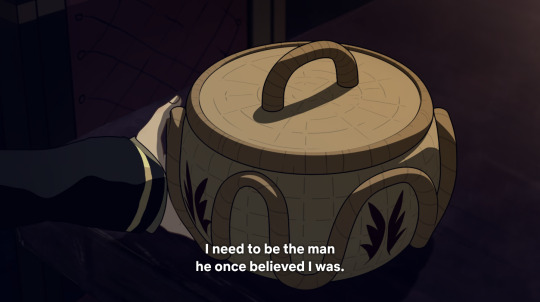
Your sister made him better. Harrow told me he was never as strong or brave
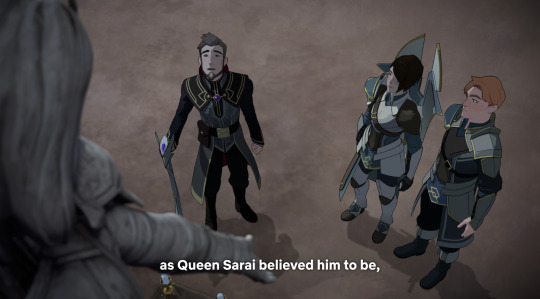
but he tried every day to be stronger and braver so he could live up to what she saw in him. (1x05)
For Viren and for Harrow, this "I want to live up to how you see me" was ultimately a good thing. In Harrow's relationship, he did his best to live up to how Sarai saw him, and that meant being a loving compassionate father, and trying to be a champion of "strength and justice". She reminded him of his best principles and understood them, and it's clear that her words got through to him in his final days with his rejection of dark magic and urging their sons to break the cycle. For Viren, Harrow's words likewise got through to him, with Viren becoming a better father for the first time since Soren and Claudia's early childhood and in what he sacrificed to save Katolis: his own refusal of dark magic, and acknowledging that like Harrow, he should've been a not just a king, but "a servant".
But in classic TDP fashion, someone believing that you can be better, or believing that someone makes you better, is not always a good thing:
Aaravos believed in humans when all the other elves and dragons thought we were worthless, stupid, dirty animals.
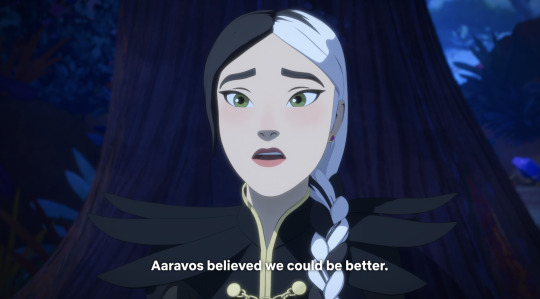
So he gave us magic.
Aaravos' 'belief' in humanity, and in Claudia by extension ("But no matter: your daughter is far more powerful"), is the foundation of her loyalty to him. Claudia is extremely receptive to how other people view her, which is why she's coarse about judgement and tries to maintain a positive internalized viewpoint ("But I'm not evil. It's me. You know me") of her own self and actions, even while routinely acknowledging that she's doing increasingly "vile, dangerous" things. Likewise, her belief in Aaravos begins with faith that he can save her father, evolves into gratitude for what he's given humanity (because until S6, dark magic is always routinely a positive net force to her), and is bolstered by her own feedback loop with a Viren who's trying his best. His assertion that "you do anything for your child never the other way around" while trying to spare her helps her justify Aaravos' actions, since he's acting on behalf of Leola, and therefore whatever he does is "necessary. Like my dad."
Conversely for elf-human relations, we have Callum and Rayla. Callum is also a burgeoning mage, and Rayla is also important to his magical journey, providing a listening ear and occasionally some sound advice. The S2 novelization goes so far as to say that Rayla is the first person to tell Callum
“I believe in you.” Callum blushed. No one had ever said those words to him before, or at least not that he remembered.
And we see her routinely express faith in her friends, particularly Callum and Ezran, even when the odds are stacked against them, other people disagree (Runaan, Lujanne, Sol Regem), or they don't have faith in themselves:
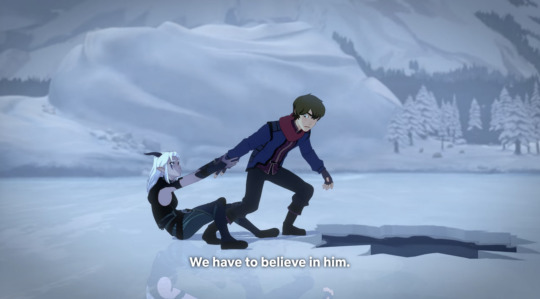
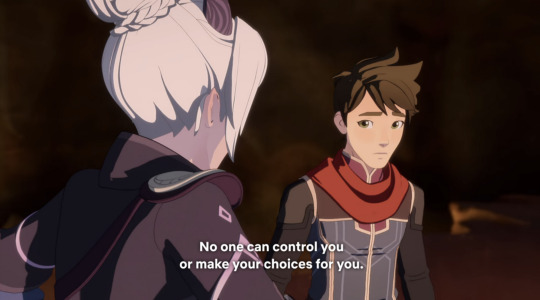
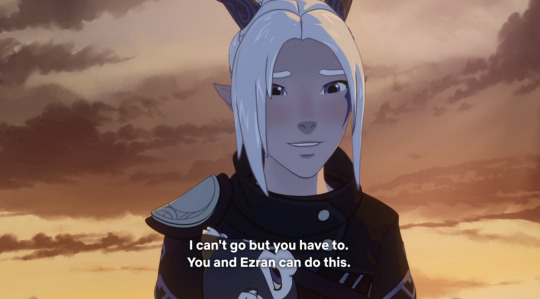
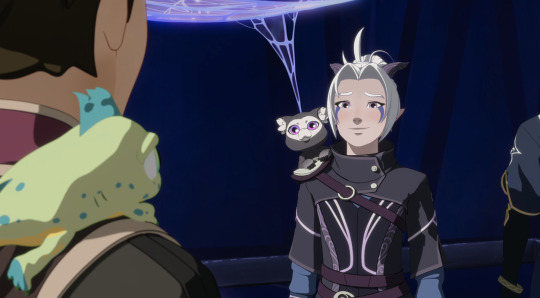
She has faith that Katolis and her boys won't be like the Silvergrove when she returns (and they aren't). She does her best to believe in Ezran in 1x09, or at least not be a jerk even if she can't totally take him at his word due to her own skepticism. She's another elf who also believes that humans are capable and strong, and sometimes even more so than elves:
The human kicked dirt at her, and Rayla scraped at her eyes, angry—infuriated, even. Humans were frustrating. Humans were clever. Humans could do anything, they could be anything, they could take their own fates and change them—
Which is, of course, the opposite thread of belief that Aaravos actually holds, which is that his pawns will always make his parts and that Callum playing into his hands and being nothing more than a pawn is inevitable. Callum also returns this in 5x01, citing "If she didn't tell me, she had a good reason," and that knowledge/belief is all that needs to not only set Rayla free, but reassert that she doesn't owe him an explanation until she wants to give one free of obligation and guilt — as she eventually does, changing her fate bit by bit at a time.
So does being believed in make you better? Overall TDP says that it can if you let it and work consistently towards it, but it does depend on what the belief is. We'll also loop back around this idea when we talk more about TDP's thread of having faith another section from now, but moving forwards to:
Belief as a Continuing Thread
The distinction between "this person believing in me" as an act of betterment versus "belief as a continuing thread," is, in my head, a difference of actively working towards living up to person's belief in you versus that belief forming a continual relationship foundation of stability and stagnation rather than change. In other words, belief as a continuing thread probably bleeds in the most into worldviews—I am a good person because I do Y, I stand by your side because of X, and as long as those beliefs built on actions aren't disrupted, they are maintained.
We see this perhaps encapsulated most in Terry and Claudia's relationship. Terry's belief in Claudia isn't about any sense of making her better ("Look at her sleeping, she's just perfect"—4x04) or guiding her down a specific path ("I can't [tell you what to do]"—6x04). He's not trying to change her, but instead, it's the foundation of his support for her. His belief in Claudia is built into their dynamic and why he is so loyal to her, as he explains in 4x09:
I've seen you do a lot of awful things, dark magic things. But I always believed in you because you had a reason.
As touched on here in a meta more about Terry overall, this is also why he doesn't like Aaravos in S6, because Aaravos' reasoning isn't love but revenge, and that's Terry's internal tipping point, even if Claudia can't recognize the distinction yet.
Of course, we can also see these continuing bonds of belief be severed. Unlike how Viren was trying to live up to what Harrow thought of him, or Harrow with Sarai, Viren and Kpp'Ar's relationship was a much more outright, direct mentor-mentee dynamic, Viren even following in Kpp'Ar's footsteps to become high mage:
I turned on him. My mentor, my... my teacher. A man who believed in me when... when I was nothing, and spent years of his life invested years of his life helping me become... what I became.
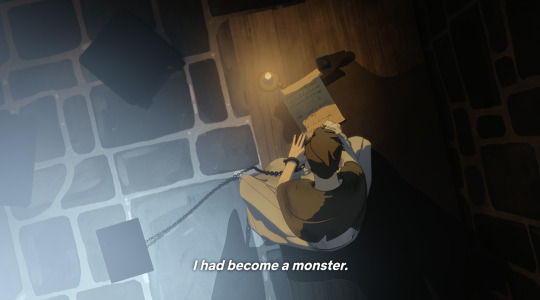
It's worth noting, I think, therefore, that while Viren does have clear regret over coining Kpp'Ar, he does still describe the act as necessary to Lissa in the past and in recounting the event in the letter. It is only after he takes Lissa's tears by force that we see him directly agree with her assessment of him being a monster. We also see Viren's continuing search for importance ("When I was nothing" / "I thought you were going to be something special, something important!" / "You're a nobody" to Kpp'Ar) parallel Claudia's views on dark magic as well ("We weren't born with magic, we were born with nothing" / "Humans had nothing").
This continuing thread of belief is also what allows Rayla to bring people back from being 'monsters' in a way with Esmeray and Runaan later on in the season through her faith that she can get through to them and help them, and that they're capable of receiving help.
In a similar vein of disillusionment of Viren and Kpp'Ar, though, we also see Soren come to this realization (and then back again, in some ways, in S6) with Viren:
I've known Viren longer than anyone here. I mean, because he's my dad, but it took me a long time to understand who my dad really is. And it was hard to see, because I really... I really looked up to him. He's smart, and the way he talks, you really believe that he's a good person, that everything he does is to protect his family, his home, or all of humanity. He makes you think that as long as you do what he says, you must be doing the right thing. Even when he asks you to do something bad. Something evil. So the truth is, someone who wants you to do horrible things and convinces you that they're good, that's a villain. My dad is a villain. And he's only gonna get more powerful, and the more powerful he gets, the more people will listen to him, and believe him, and follow him.
We see the continuing thread of Soren not trying to change Viren or Viren trying to change for him (in arc 1), but of Soren understandably believing in his father and Viren's judgement precisely because of things Soren perceives as lacking in himself ("I know I'm not the smartest / Dad is so smart, so I figured there must be a good reason") and because as a child / young adult, you're inclined to believe whatever your parent tells you at more or less face value. That said, Soren does talk specifically about how belief in others can intersect with belief in leadership, which is interesting in its own way. So let's move onto:
Belief as Faith / Having Faith In Our Leaders
Having faith in our leaders is something we've touched on already, albeit indirectly. Sarai believed in Harrow to be "a champion of love and justice"; Soren and Claudia believed at different intervals that their father would be a good leader. We see this reflected in Janai and Amaya's relationship predominantly in season 6:
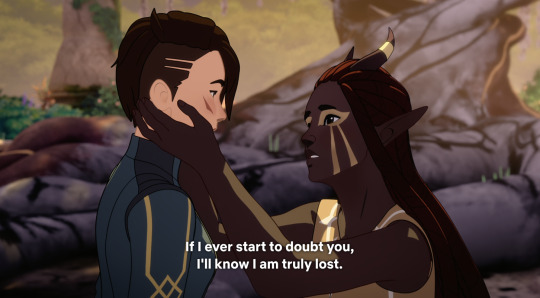
Do you think I can lead my people after everything that's happened, all the mistakes I've made?
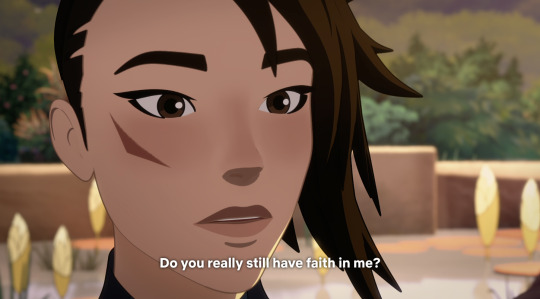
We see this similar theme in how Opeli and Corvus interact with Ezran in S3, where they support him as a monarch, specifically, as well as a person:
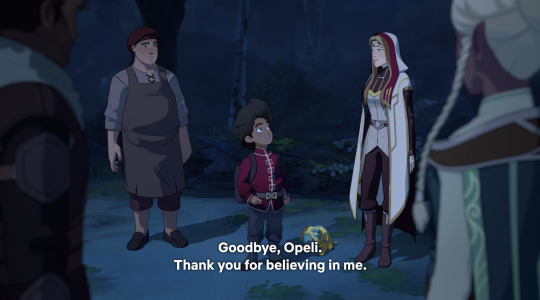
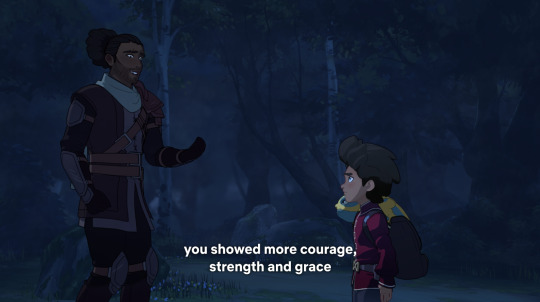
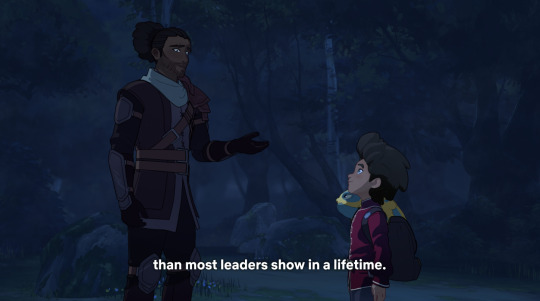
Ezran and Janai are also characters who tend to have a lot of faith in others, as well, which is part of their leadership. Janai has "patience and faith" that they can rebuild, that the architect can make her amends, etc. Ezran routinely has steadfast faith in his loved ones and their ability likewise to be better (not executing Viren, setting Soren and Claudia free, "She'll know what to do" / "she's alive, and wherever she is, she loves you too" about Rayla, "I think he would want you to, if you wanted to" about Callum and Harrow, etc). Even with Zym in season two:
But we'll get it, no matter how impossible it seems. We believe in ourselves, and we're not giving up, are we?
which is also a sentiment Janai extends to her people:
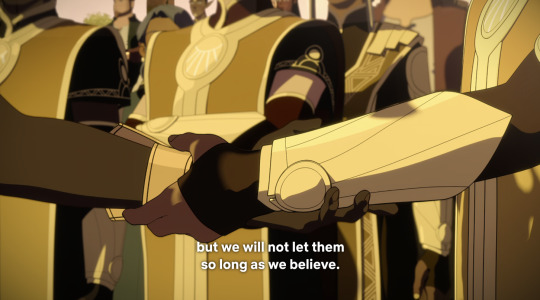
So we can have faith in others, in ourselves ("I will learn magic. It's who I am"), in our leaders, some prejudiced worldviews ("No, humans are liars" / "Are they really your friends, or are they just taking advantage of you?") and have all those things intermingle. We've talked briefly about disillusionment in threads of continued belief, and failing to live up to the beliefs / views of how others see us, or when belief breaks. I want to close this out by talking about Runaan and Rayla, briefly, namely:
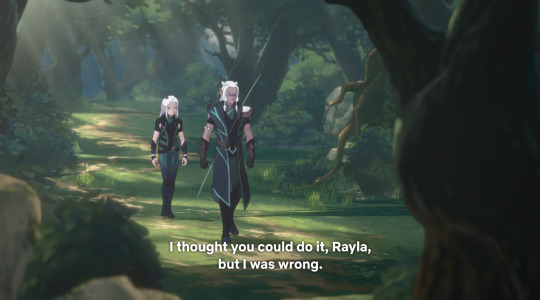
This fits in this section (in my head) precisely because Runaan is Rayla's leader as well as her father, which is a unique dynamic that only Viren-Soren&Claudia get close to replicating, of being believed in by someone who also very explicitly tells you what to do (hi Claudia with Aaravos). Runaan lived in one reality (Rayla can be an assassin) and then immediately went to the other (she never will be) with no in between.
Meanwhile, we have characters like Ellis and Callum, who are able to acknowledge other people's realities even if they can't (for a variety of reasons) fully commit to them and sit somewhere more in the middle, which I think is interesting, particularly when it likewise comes to changing plans or acknowledging other realms/perspectives of reality.
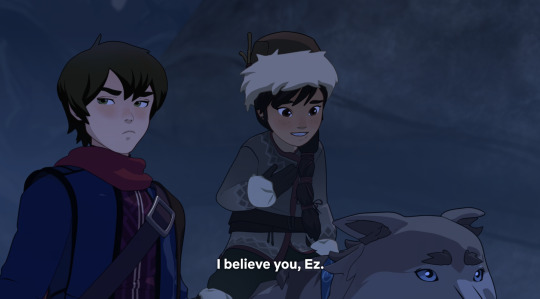
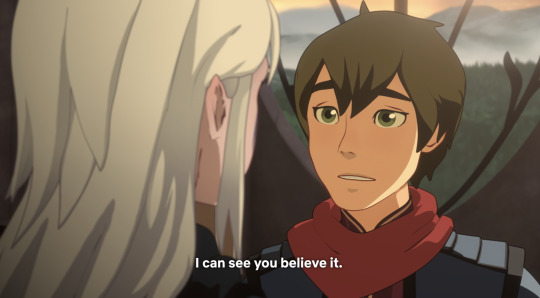
And if I go any further into those weeds I'll start talking about TDP's whole emphasis on trust that is twice as long as this meta already is, I'm sure, so with that I'll wrap things up (sort of).
Conclusion, Kind Of
This doesn't have a real conclusion because this is so sprawling with like, a hopefully but not necessarily coherent common thread, but basically:
When you act in alignment with how others see you, this can help you live up to your 'full potential' — good or bad. And if it's bad, that might be a time to break their continued thread of faith in you, or you towards them, in order to be something truly better and new. All relationships, positive or negative, depend on faith/belief because they depend on reliability and expectation, and when those things are broken, this can either transform a relationship for the better or demolish it completely.
Are you having fun? Was this fun?
Anyway can't wait for S7 to ruin my life with Terry-Claudia, Callum-Ezran, and Callum-Rayla's threads of belief in particular.
—Dragons out
46 notes
·
View notes